#fengshen yanyi
Explore tagged Tumblr posts
Text
One nerd's musing about Chinese religion and "respect"
-I try to stay away from fandom discourse, but, much like how you can smell the stench from a dumpster fire without walking into said dumpster fire, I've noticed something that seemed to come up a lot in western JTTW + adjacent fandoms: "respect Chinese religion".
-Usually as a reason for why you shouldn't ship a character, because of fucking course it's shipping discourse too.
-And my first reaction is "Man, you are taking Chinese religion too darn seriously, more than people who are born and raised in China."
-My second reaction is "I mean, most of us are atheist/agnostic by default anyways, with a good number of what I'd call 'atheist/agnostics with superstitions': people who said they were not religious, yet believed in Fengshui or divinations and burnt incense at temples for good luck."
-My third reaction: "But why do I get the feeling that when you mention 'Respect', you are thinking about something completely different?"
-Then I reread an essay from Anthony C. Yu, "Religion and Literature in China: The "Obscure Way" of Journey to the West", and the metaphorical lightbulb just lit up over my head.
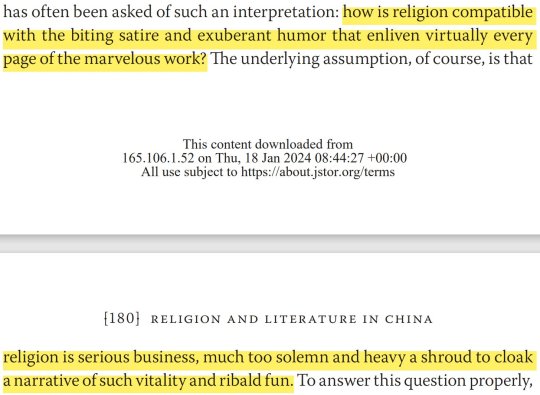

(Everything below applies more to Daoism + associated folk religions, but by the time most classic Chinese vernacular novels were written, the blending of the three religions had become well and truly mainstream.)
(The conception of gods differs from dynasty to dynasty. What I'm describing here is mostly based on Ming and Qing ones; if you went back to Han or pre-Qin times, most of these would not apply.)
(I am one of the "atheist/agnostic by default" people. I just have an interest in this kind of stuff. I am also just one Chinese person, and an actual Daoist/Buddhist/Religion Studies researcher would probably have a lot more valuable information and perspective to offer when it comes to contemporary practices and worship. Like any people on the internet: take my words with a grain of salt.)
-Even in the past, when society was far less secularized, Chinese gods are not omniscient, perfect beings whose worship is a solemn, humorless affair. Some's worship are Serious Business, but that has more to do with the sort of gods they are and the patronage they enjoy, not godhood in and of itself.
-And even the ones that you are supposed to "treat seriously" are still very human. To use an analogy I've used plenty of times before: you respect and fear them in the same way you'd respect and fear an emperor's official, or the emperor himself, because if you don't, you are not gonna like the consequences.
-However, unlike Jesus, the emperor & his officials were capable of being temperamental, flawed, or an outright asshole, divine or not. Ideally, they wouldn't be, and if you were one of the "serious" believers——people who actually got an official permit, became ordained clergy, and went to live in a temple, you were unlikely to think of your gods in that manner.
-But it wasn't a complete, utter impossibility. The lower you go in the pantheon, the closer you get to popular religion, the less "serious" the gods and their worship become. By that, I mean general attitude, not sincerity of faith. You still shouldn't be rude to them, but, well, they are more likely to take a joke in stride, or participate in the "vulgar" pleasures of commoners because they weren't as bound to Confucian moral standards or religious disciplines.
-To stretch the same analogy further: you should still respect your village head, they could still give your ass a good spanking for being a disrespectful brat, but you were not obligated to get on your knees and kowtow to them like you would do in front of a provincial magistrate, the emperor's minister, or the emperor himself, nor did they have the power to chop your head off just because you were rude.
-On the other hand, the emperor would never visit a random peasant just to help them fix their broken plow or treat them to a nice meal, but your village head could, and your relationship would probably be warmer and a lot more personal as a result.
-Your respect for them was more likely to stem from the things they actually did for you and the village as a whole, instead of something owed to this distant, powerful authority you might never get to see in your lifetime, but could change its course with a single stroke of a brush.
-Now exchange "village head" for your run-of-the-mill Tudis and Chenghuangs and friendly neighborhood spirits (because yes, people worshipped yaoguais for the exact same reasons), emperor + his officials for the Celestial Bureaucracy, and you'd have a basic idea of how Chinese religions worked on the ground level.
-This is far from absolute: maybe your village head was a spiteful old bastard who loved bullying his juniors, maybe your regional magistrate was an honest, upright man who could enjoy a good drink and a good laugh, maybe the emperor was a lenient one and wouldn't chop your head off for petty offenses. But their general degree of power over you and the closeness of your relationships still apply.
-Complicating the matter further, some folk gods (like Wutong) were worshipped not because they brought blessings, but because they were the divine equivalent of gangsters running a protection racket: you basically bribed them with offerings so they'd leave you alone and not wreck your shit. Famous people who died violently and were posthumously deified often fell into this category——shockingly enough, Guan Yu used to be one such god!
-Yeah, kinda like how your average guy could become an official through the imperial examinations, so could humans become gods through posthumous worship, or cultivate themselves into immortals and Enlightened beings.
-Some immortals aren't qualified for, or interested in a position in the Celestial Bureaucracy——they are the equivalent of your hermits, your cloistered Daoist priests, your common literati who kept trying and failing the exams. But some do get a job offer and gladly take it.
-Anyways, back to my original point: that's why it's so absurd when people pull the "Respect Chinese Religion1!!1!" card and immediately follow up with "Would you do X to Jesus?"
-Um, there are a lot of things you can do with Chinese gods that I'm pretty sure you can't do with Jesus. Like worshipping him side by side with Buddha and Confucius (Lao Tzu). Or inviting him to possess you and drink copious amount of alcohol (Tang-ki mediums in SEA). Or genderbend him into a woman over the course of several centuries because folks just like that version of Jesus better (Guan Yin/Avalokitesvara).
-But most importantly, Chinese religions are kinda a "free market" where you could pick and choose between gods, based on their vicinity to you and how efficient they were at answering prayers. You respect them because they'll help you out, you aren't an asshole and know your manners, and pissing them off is a bad idea in general, not because they are some omnipotent, perfect beings who demand exclusive and total reverence.
-A lot of the worship was also, well, very "practical" and almost transactional in nature: leave offerings to Great Immortal Hu, and he doesn't steal your imperial seal while you aren't looking. Perform the rites right and meditate on a Thunder General's visage, and you can temporarily channel said deity's power. Get this talisman for your kids at Bixia Yuanjun's temple, and they'll be protected from smallpox.
-"Faith alone" or "Scripture alone" is seldom the reason people worship popular deities. Even the obsession with afterlife wasn't about the eternal destination of your soul, and more about reducing the potential duration of the prison sentence for you and your loved ones so you can move on faster and reincarnate into a better life.
-Also, there isn't a single "canon" of scriptures. Many popular gods don't show up in Daoist literature until much later. Daoist scriptures often came up with their own gigantic pantheons, full of gods no one had heard of prior to said book, or enjoyed no worship in temples whatsoever.
-In the same way famous dead people could become gods via worship, famous fictional characters could, too, become gods of folk religion——FSYY's pantheon was very influential on popular worship, but that doesn't mean you should take the novels as actual scriptures.
-Like, God-Demon novels are to orthodox Daoism/Buddhism what the Divine Comedy is to medieval Christian doctrines, except no priests had actually built a Church of Saint Beatrice, while Daoists did put FSYY characters into their temples. By their very nature, the worship that stemmed from these books is not on the same level of "seriousness" as, say, the Tiantai school of Buddhism and their veneration of the Lotus Sutra.
-At the risk of being guilty of the same insertion of Christianity where it doesn't belong: You don't cite Dante's Inferno in a theological debate, nor would any self-respecting pastor preach it to churchgoers on a Sunday.
-Similarly, you don't use JTTW or FSYY as your sole evidence for why something is "disrespectful to Chinese religion/tradition" when many practitioners of said religions won't treat them as anything more than fantasy novels.
-In fact, let's use Tripitaka as an example. The historical Xuanzang was an extraordinarily talented, faithful, and determined monk. In JTTW, he was a caricature of a Confucian scholar in a Buddhist kasaya and served the same narrative function as Princess Peach in a Mario game.
-Does the presence of satire alone make JTTW anti-Buddhist, or its religious allegories less poignant? I'd say no. Should you take it as seriously as actual Buddhist sutras, when the book didn't even take itself 100% seriously? Also no.
-To expand further on the idea of "seriousness": even outside of vernacular novels, practitioners are not beholden to a universal set of strict religious laws and taboos.
-Both Daoism and Buddhism had what we called "cloistered" and "non-cloistered" adherents; only the former needed to follow their religious laws and (usually) took a vow of celibacy.
-Certain paths of Daoist cultivation allow for alcohol and sexual activities (thanks @ruibaozha for the info), and some immortals, like Lv Dongbin, had a well-established "playboy" reputation in folklore.
-Though it was rarer for Buddhism and very misunderstood, esoteric variants of it did utilize sexual imageries and sex. And, again, most of the above would not apply if you weren't among the cloistered and ordained clergy.
-Furthermore, not even the worship of gods is mandatory! You could just be a Daoist who was really into internal alchemy, cultivating your body and mind in order to prolong your lifespan and, ideally, attain immortality.
-This idea of "respect" as…for a lack of better words, No Fun & R18 Stuff Allowed, you must treat all divinity with fearful reverence and put yourself completely at their mercy, is NOT the norm in Chinese religious traditions.
-There are different degrees and types of respect, and not every god is supposed to be treated like the Supreme Heavenly Emperor himself during an imperial ceremony; the gods are capable of cracking a joke, and so are we!
TL;DR: Religions are complicated, and you aren't respecting Chinese religions by acting like a stereotypical Puritan over popular Chinese deities and their fictional portrayals.
#chinese religion#chinese mythology#chinese folklore#fandom discourse#journey to the west#xiyouji#investiture of the gods#fengshen yanyi
2K notes
·
View notes
Text

Big 3 in Chinese Mythology (in popularity).
#nezha#nezha the third prince#sun wukong#erlang shen#yang jian#journey to the west#jttw#fengshen yanyi#fsyy#chinese mythology#my art
2K notes
·
View notes
Text
Chinese Mythology: Investiture of the Gods and the Heavenly Court
If there is one piece of literature that can define the mythology of an entire culture, what would that be? The Bible? The Homeric Epics? The Vedas?
None of these works can encompass an entire pantheon or mythological universe. Similarly, Chinese mythology does not rely purely on Journey to the West. Two other pillars of mythology are the 封神演义

and the 山海经 (the Classic of Mountains and Seas), an old National Geography magazine with lots of myths thrown in.

There are many, many more ancient and famous works, but these three are generally very widely-known.
I’ll be focusing on the Fengshen Yanyi (Romance of the Investiture of the Gods, or just Investiture of the Gods in general). BTW, investiture means something like inauguration, deification or promotion in case it’s an unfamiliar word.
The Fengshen Yanyi
I covered this one very briefly in my Ne Zha post, linked here, but Fengshen Yanyi was a novel written in the 16th century by Xu Zhonglin.
It chronicled (in a fantastical manner, of course) the war between the King of Shang

and the eventual King of Zhou

It’s treated very much like the Trojan War, in which different gods assist in the battle, and incorporates many classic Chinese heroes.
Since it was written fairly recently by Chinese standards (only a few hundred years ago as opposed to a few thousand years ago), it’s become one of the main sources of information on mythology and the characters within it.
The Zhou/Shang battle itself occurred over 3000 years ago, in 1056 BCE, and lasted some fifty years.
It’s fairly impossible to cover the events of the novel in a single post since that would be the longest post in Tumblr history, but I will only cover its premise, not its plot. Honestly, I’m not even clear on the exact details of the plot of Fengshen myself, since it’s so long and complicated.
Chinese mythology is incredibly complicated. Even the most widely-accepted versions of myths are almost guaranteed to be inaccurate to their original versions thousands of years ago. Dates, times and who’s who are impossible to determine. As such, take what I say with a grain of salt, and do your own research, as painful as it may be. This is only meant to give an idea of what’s going on.
Additionally, the Fengshen Yanyi (also called the Fengshen Bang, or Deification List/Plaque), is just a novel. Think of it as a historical fantasy novel, or the Lord of the Rings Plus. It may be very foundational today, but it’s not the end-all-be-all of mythology. This is also true for Journey to the West, which is a fictional tale!
After all that preamble, let’s begin.
___
So, the highest official is the Haotian Emperor 昊天大帝. He’s the head honcho of the Heavenly Court.
I couldn't find any pictures of the Haotian Emperor (in popular culture he's usually depicted as young and hot, unlike the Jade Emperor, who's usually depicted as an old dude). As I mentioned in my Ne Zha post, it's debated whether or not the Haotian Emperor and the Jade Emperor are the same person.
I will assume them to be different people even though it's like 60% sure they're the same person, since I already referred to the Emperor in my Ne Zha post as the Jade Emperor. As such, Haotian Emperor is higher-ranked than the Jade Emperor, who works for Haotian.
Again! Time for a SUPER LONG backstory that is essential but also not ENTIRELY relevant to the actual plot of Fengshen. Think of this as a description of how the Fengshen Yanyi happened, or like historical background behind a war.
The Heavenly Court, rather than being a loose collection of gods with one ruler like in Greco-Roman mythology, is a proper government, with bureaus, supervisors, and minimum wage office workers. As such, it’s not exactly super desirable to work for the Heavenly Court.
Sure, you get to be a god, but it’s also the equivalent of working a cubicle job for eternity. You’re also a very lowly god: most heavenly officials aren’t powerful, just old: you could even get your ass kicked by a random monkey (foreshadowing).
Not fun.
The Haotian Emperor is feeling a little lonely and overworked. He thinks there’s not enough workers in the Heavenly Court, so he wants to do some hiring (more on this later! Keep this part in mind.)
Who’s currently up in Heaven? Well, in Daoist mythology, the Dao created one, one created two, two created three, and three created everything (道生一,一生二,二生三,三生万物). What this means is that the Dao created the foundations of the world: the Three Pure Ones, three super-old super-powerful immortals.
These three super powerful immortals are as follows:
元始天尊 Yuanshi Tianzun, or Primordial Heavenly Lord


This is him in Ne Zha 1 (2019).
After he was created, he oversaw and supervised the creation of everything else.
灵宝天尊 Lingbao Tianzun, or Treasured Heavenly Lord

Lingbao Tianzun was created from Yuanshi Tianzun.

道德天尊/太上老君 Daode Tianzun (Virtuous Lawful Heavenly Lord) or Taishang Laojun (High Elder Lord)
The reason he has two names is because it’s unknown if Taishang Laojun and Daode Tianzun are the same person by different names: the answer is probably, but not 100%. He is the oldest, most powerful one. He is also considered to be Lao Zi (Lao Tsu), the founder of Daoism (I sometimes switch between Daoism and Taoism, but they’re the same thing).

In the above picture, Daode Tianzun is on the left, Yuanshi Tianzun is in the middle, Lingbao Tianzun is on the right. Yuanshi and Lingbao look very similar, but you can always identify Daode since he's the oldest one so he's the only one with white hair.
However, these three, despite being at the centre of everything, are not the most powerful. Chinese mythology and Daoism are messy. Stay with me: I promise I’m getting to the actual explanation of the Fengshen Yanyi soon.
The Creation Spirit created more beings before these three pure ones. One of these beings is called 鸿钧老祖 Hongjun Laozu, or Grandmaster of Eternal Balance
Could not find a picture of him, so just imagine a super old guy with big fancy robes.
(There is another one of these beings called Nuwa, the mother of all: she essentially sculpted humans out of clay. Keep her in mind, she’s important).

This is Nuwa! Technically her name is Nüwa, it's pronounced Nyoo Wah.
He takes three disciples: the Three Pure Ones, Yuanshi Tianzun, Lingbao Tianzun, and Daode Tianzun.
Sometimes, these three disciples are Yuanshi Tianzun, Lingbao Tianzun, and another guy called 通天教主 Tongtian Jiaozhu (Teacher of All Through Heaven, or Grandmaster of Heaven). Tongtian Jiaozhu is the one that appears in Investiture of the Gods.

Yuanshi Tianzun and Daode Tianzun (Lao Zi) create the 阐教, or the Chan Sect to teach Taoism their way. The features of the Chan Sect are that there is no one leader- Yuanshi Tianzun and Lao Zi both teach the sect, they pick their disciples very strictly and only choose the best of the best, and every single disciple must follow strict rules and live very properly.
Fun fact: I’m sure you’ve heard of the concept of Zen. Zen is just the Japanese pronunciation of Chan: Chan Buddhism (or Zen) is the most widely-practised version today.
However, Tongtian Jiaozhu creates his own sect instead of the Chan Sect because he doesn’t like the prim and proper way they do things. His sect is called the 截教 or Jie Sect. His sect takes in all manners of people under the sun and is less proper, but also smaller than the Chan Sect.
Why do I even mention these 2 sects? Well, in Investiture of the Gods, the main conflict is between King of Shang and King of Zhou (who wants to overthrow him since King Shang is a tyrannical brutal ruler), right?
Nope! In fact, it’s really more of a conflict between the Jie and Chan sects. The Zhou/Shang war is more of an excuse to go to war. The Jie fight for the King of Shang, and the Chan fight for the rebellion (for the eventual King of Zhou).
Why use the Zhou/Shang war? Well, the King of Shang kind of sucks, so people want a way to get rid of him. Remember Nuwa, the mother goddess who created humans? She also, by the way, made pillars to hold up heaven, so she’s a big deal.
Well, the King of Shang goes to her temple to worship but gets sloppy drunk and hits on a statue of her. This is like the equivalent of Trump (or *Insert World Leader*, I guess, depends on your politics) sending a tweet saying he’s going to fuck the Virgin Mary. The King of Shang leaves a sex poem about Nuwa on the wall of her temple.
Nuwa sees this and gets super mad. She summons a 1000-year-old nine-tailed fox spirit. Fox spirits are generally seen as promiscuous sexual spirits, who disguise themselves as beautiful women and bewitch men to bring about the downfall of dynasties.

Nuwa tells the fox spirit that if she can bring down the Shang dynasty, she’ll make her immortal. (In the novel she sends two other spirits as well, one a spirit of a pipa, which is an instrument, and the other a spirit of a nine-headed pheasant, but these two aren’t as important as Daji, and they both get discovered and executed anyway).

This is the Zhiji Jing (Pheasant Spirit)

This is the Pipa Jing (Pipa Spirit), ignore the watermark, I copied this from Google. Pipa is almost like a Chinese cross between a guitar and violin. It's a very elegant and beautiful sounding instrument.



This is Daji, accompanied by a photo of the actress who plays Daji in the recent Fengshen movie series. The movies are a solid 7.5/10, pretty good but not SPECTACULAR, but Na Ran's acting as Daji is amazing. She also happens to be gorgeous!
Sweet deal! The fox agrees and disguises herself as a gorgeous war prize taken by the King of Shang. The body she inhabits is called Su Daji, who is the daughter of one of the regional lords conquered by the King of Shang.
In the original tale, Su Daji’s father (this story is a little muddled, so read this part with a big maybe) gifts her to the King of Shang to appease him. Asshole dad.
Another version is that Su Daji is sent away by her father for her safety and kills herself to avoid being taken as a concubine by the King of Shang- very unfortunately for her, the fox spirit inserts herself into her body to bewitch the King. (Fox spirits are generally cruel, and it’s a huge dick move to have someone use your body to sleep with your biggest opp).
When Daji arrives, she immediately catches King of Shang’s attention. He becomes absolutely bewitched by her, and spends so much time, money and thought on her that he neglects his state and begins ruling with a tyrannical iron fist. Daji, since she’s really a fox spirit, is cruel and sadistic, and invents a number of scary torture devices to torture King of Shang’s opps.
You can Google these devices yourself. A little gruesome to repeat.
One of the most famous parts of the Fengshen Yanyi is what’s called the Deer Pavilion 鹿台, which is an example of the ostentatious and luxurious nature of the acts King of Shang did for Daji.
In the Deer Pavilion, the King of Shang builds a lake filled with good wine and constructs a forest of meat for him and Daji to lounge in. Wine pool meat forest 酒池肉林 (jiu chi rou lin) is now a Chinese saying for excessive extravagance.
The entire nation is super, super mad at the King of Shang and Daji, and decides to revolt against them. This rebellion is led by Ji Fa (the eventual King of Zhou) and Jiang Ziya, his tactician (think of Jiang Ziya as Odysseus: the clever, capable and clear-headed strategist). BTW Jiang Ziya is Ji Fa’s father-in-law, so it’s not exactly an Agamemnon-Odysseus relationship.
OKAY!!!
Remember when I said the Haotian Emperor was feeling a little lonely up in heaven and wanted some workers? Feels like a century ago.
The three immortals in charge of the Chan and Jie sects (Yuanshi Tianzun and Lao Zi for the Chan sect, and Tongtian Jiaozhu for the Jie sect) decide they’re going to make what’s called a Fengshen Bang.
Roll credits!
Just kidding. You wish.
As I said, Fengshen Bang means Deification Plaque, or a less proper translation is just List of Gods to Promote. What are the contents of this Fengshen Bang?
Remember when I said working for the Haotian Emperor isn’t exactly a good thing? In fact, it kind of sucks. The prerequisite for getting more workers in heaven is that whoever goes to work for the emperor has to die first and spend the rest of eternity working a cubicle job if they suck and if they’re powerful they end up like a special ops force, just with no glory or money. Who TF wants to do that?
Think of the Fengshen Bang as the Death Note of ancient China. The Haotian Emperor and the three immortal sect masters can tell that a bunch of people are going to die in the upcoming Zhou/Shang war, so they decide that whoever dies in the war will get their name put on the Fengshen Bang and die.
There’s another interpretation that they just put a whole bunch of names on the Fengshen Bang before the war and whoever manages to not die gets their name taken off.
It can also be interpreted as Santa Yagami’s naughty list: whoever misbehaves gets their name put on as well.
Either way, it’s functionally the same: no one wants their name written down on that list!!
The two sects both don’t want their disciples to die and leave their sect weakened in comparison, so they go home to tell their disciples, listen up and don’t cause any trouble.
The war isn’t that long compared to the life of a cultivator (functionally immortal compared to only 50 years of war) so as long as you keep your head down and manage to survive you’ll be okay.
However, there’s this one dude: his name is 申公豹 Shen Gong Bao (Panther Elder Shen, where Shen is just his last name) and he got kicked out of the Chan sect for being an asshole. He’s also a panther spirit. (You may remember him from Ne Zha 1 and 2 if you watched it!)


This is a carving of Shen Gong Bao as well as his appearance in Ne Zha 1 and 2 (2019 and 2025 movies).
He decides he’s going to get some revenge on the Chan sect, so he tells everyone in the Jie sect that working for the King of Shang (remember, asshole dictator) is great: he treats all his subordinates really well, and that his bad reputation is just the Chan sect being stuffy old dudes. He wants the Jie sect to go fight for the asshole King of Shang against the Chan sect.
About half of the Jie disciples are dumb, and think that sounds great! So they descend from their halls and go to find the King of Shang.
Jiang Ziya, the rebellion tactician, anticipated this, and dispatched half the Chan forces to go help fight. The Jie disciples get their asses beat and all die.

This is a painting of Jiang Ziya. Don't question why his forehead is bulging out Megamind-style: that's just his big brain.

This is Jiang Ziya in the Jiang Ziya animated movie (2020) set in the same cinematic universe as the two Ne Zha movies. This movie kind of flopped, but I like the character design at least.
The other half of the Jie sect is like, how dare you try to beat us up! They all go down from their halls to go fight the Chan sect for revenge. Jiang Ziya prepares his troops very well, so the other half of the Jie sect gets their asses beat as well.
Oops! Now the Jie sect ends up functionally all on the Fengshen Bang. Since the Chan sect suffered losses as well, about a third of their newest group of disciples all die as well.
The Haotian Emperor is happy to have an army of minions, everyone else is not happy.
I’m assuming Tongtian Jiaozhu is really fucking mad that his disciples are all idiots, but now 90% of his sect is super, super dead and working depressing government cubicle jobs (the ones that are better trained are doing special ops work).
By the way, remember Ne Zha? After he killed himself graphically and was revived, he survived the entire time and ascended to an immortal to work as a marshall in Heaven.
Working in Heaven is bad if you’re forced to through dying: if you ascend to immortality through cultivation, you’re super powerful and it’s actually a great job.
So Ne Zha is having a great time absolutely smashing up the Jie sect and King of Shang’s forces. Also in Heaven working cushy great jobs are Ne Zha’s asshole dad Li Jing (now ascended to a deity, the Pagoda-Bearing Lord), Ne Zha’s two brothers Jin Zha and Mu Zha, and Erlang Shen (who I will cover in a different post).
These are all “good guys” on the side of the Chan, so they fight against the dictator King of Shang.
Essentially, the story of the Fengshen Yanyi is about a bunch of guys trying very hard not to catch Heavenly Lord Yagami’s attention and end up on the Death Note. However, since most of them are dumb, they fail anyway.
#china#chinese animation#chinese mythology#chinese culture#chinese#ne zha#ne zha 2#jiang ziya#investiture of the gods#fengshen yanyi#fengshen cinematic universe#chinese history#history#historical fiction#classic literature#ancient history#ancient china
153 notes
·
View notes
Text
Master and Disciple cont.
Pt.1 | Pt.2


195 notes
·
View notes
Note
Have you read this unfinished comic?
https://x.com/oubing_bot/status/1354538287839510529
It's really sad. With Nezha losing his memories of his past and his relationship with Ao Bing. Making Nezha the now "perfect" warrior of heaven and have new friends.
And Ao Bing gets left behind and forgotten 😢 and this is here the idea comes. That He gets threaten to not interact with the Marshal and without Nezha. Who was the one who helped him with his self-esteem and being his support not being there. And to make it worse. He is not in fighting condition after what happened during the war.
He might be attacked by the Dragon Clan. Who wants to punish him for going against the Clan in the past.
Yeah, I read it, and it provided some inspiration for my Black Myth, New Gods story.
Honestly, it's so sad especially with how Ao Bing, a victim of child abuse, is now a victim of workplace abuse.
He's finally gotten what he's always "wanted", what he was told was his destiny, and... nothing. There is no satisfaction, only more discrimination and punishment.
And the only friend he ever had, the one person who can anchor him, doesn't remember him. Worse, his best friend has replaced him with more "appropriate" company for his new social standing.
I will make a post about how BMNG!Ao Bing was affected by this and how this impacts his arc
#ao bing#nezha#thanks for the interest#ask#ask me anything#anon ask#nezha 2019#nezha 2025#nezha (2019)#nezha birth of the demon child#ne zha#ne zha 2#nezha 2#black myth new gods au#black myth new gods#敖丙#哪吒2#哪吒#哪吒之魔童降世#藕饼#li nezha#fsyy#fengshen yanyi#investiture of the gods#fancomic#fan comic#oubing#lotusdragon#lotusdragonshipping#nezha x ao bing
44 notes
·
View notes
Text
Celestial Water Monkeys
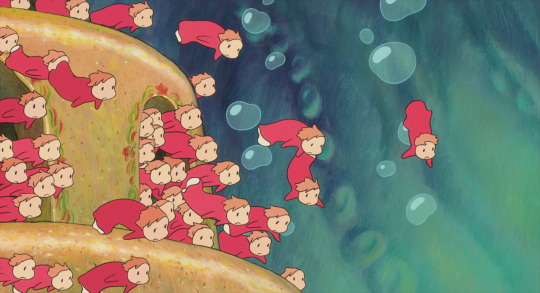
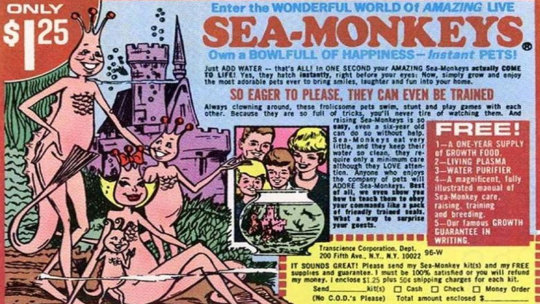
Was discussing in the notes of this post with @silverlycanthropelover about the possibility of Celestial/Stone Monkeys surviving the Great Flood by adapting to the sea.
One of the jokes is that "Sea Monkeys" (the frozen brine shrimp toy), are actually a misunderstanding of sea dragon records talking about the little mer-monkeys that inhabited their seas.
Basically
Ao Guang: "What are those things hiding in your mane?" Ao Shun, surrounded by tiny mermaid-like monkeys: "I dunno man, they just showed up one day, and they won't stop picking through my fur." Ao Guang: "Why haven't you scared them off?" Ao Shun: "Honestly? They are pretty adorable. They clean my body of parasites, and comfort me when I'm feeling unwell." Sea Monkeys: (*happy chirping + porpoise-like squeaks!*) Ao Guang: "They do seem very useful... How do I go about hiring them?" Ao Shun: "I believe you cannot choose them brother, they choose you." (*cut to hundreds of years later when Ao Guang is lying at the bottom of the East Sea, despaired at the loss of his youngest pup Ao Bing*) Sea Monkeys: "Chirrp?" Ao Guang: (*looks up to see a swarm of brightly-coloured mer-monkeys, all swimming around his gigantic body as they pick off the barnacles and parasites that settled in his depression.*) Leading Sea Monkey, petting the king dragon's face with sympathy in their eyes: "Chirrrrp." Ao Guang: (*smiles for the first time in weeks*) :')
Like pilot fish to a great white, the smaller creatures stick to dragons in a symbiotic relationship. The royal dragons are very protective of their monkeys. Ao Guang refuses to acknowledge the irony of a Stone Monkey being one of his greatest annoyances, whilst tending to his beloved servants.
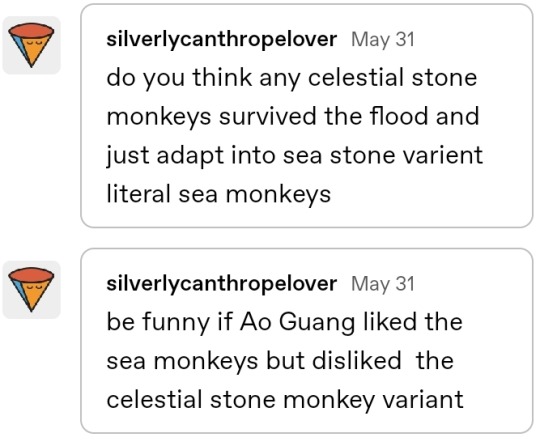
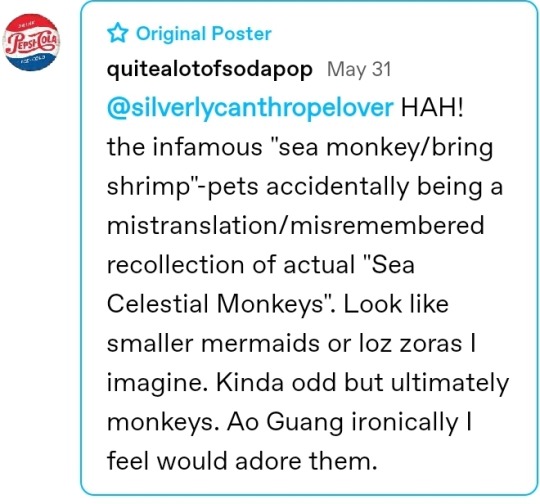
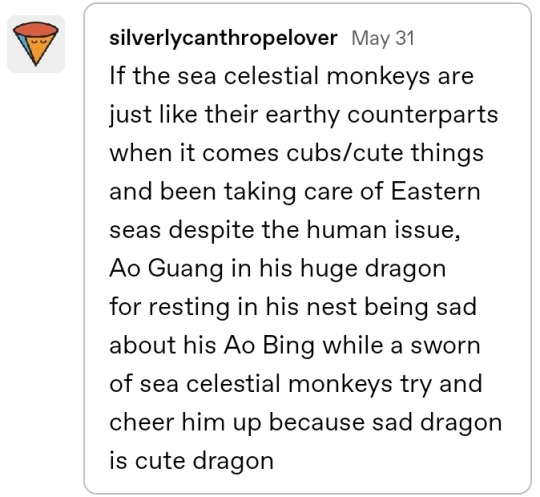
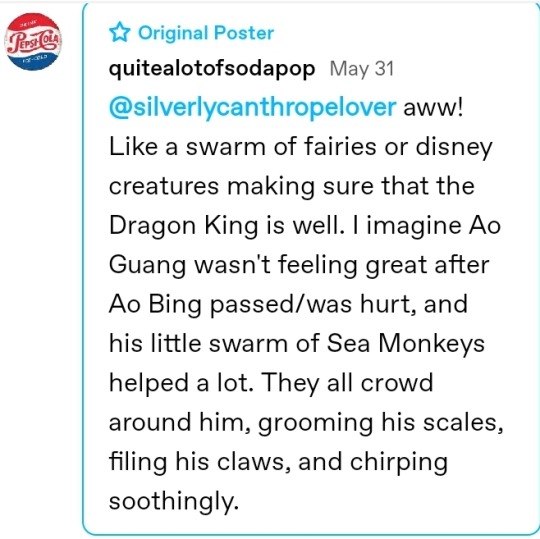
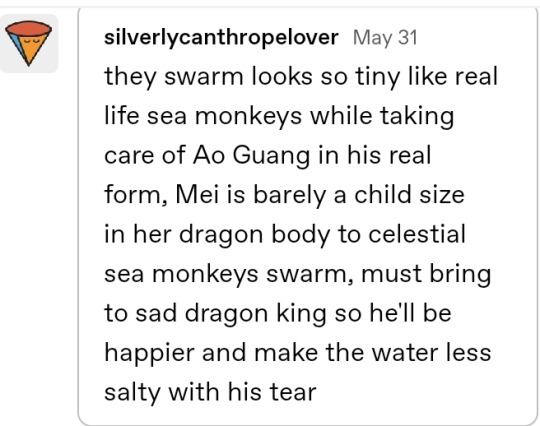
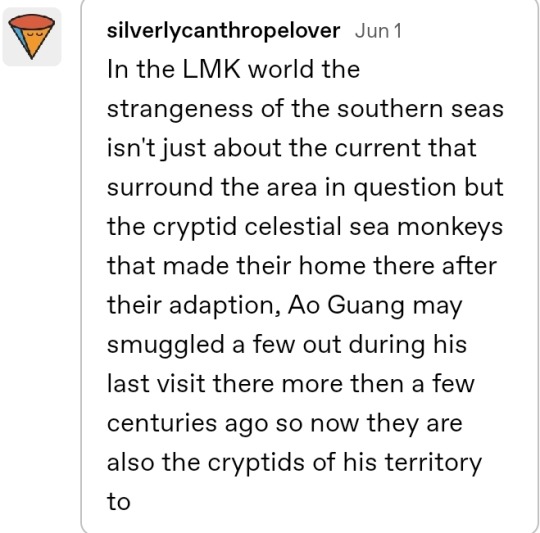
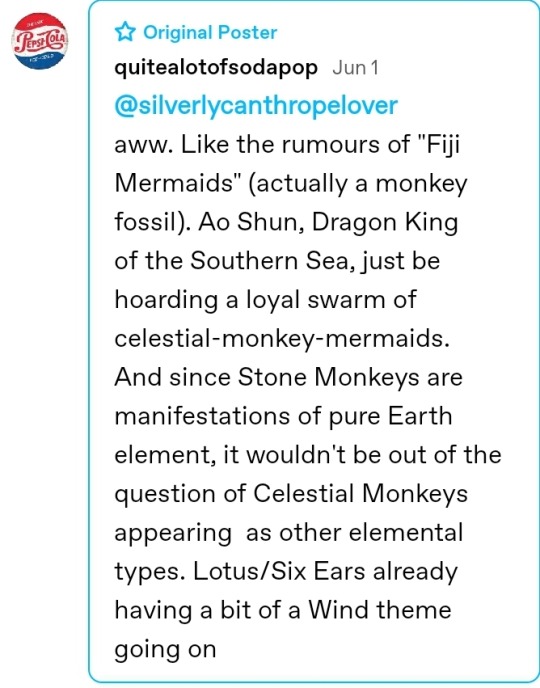
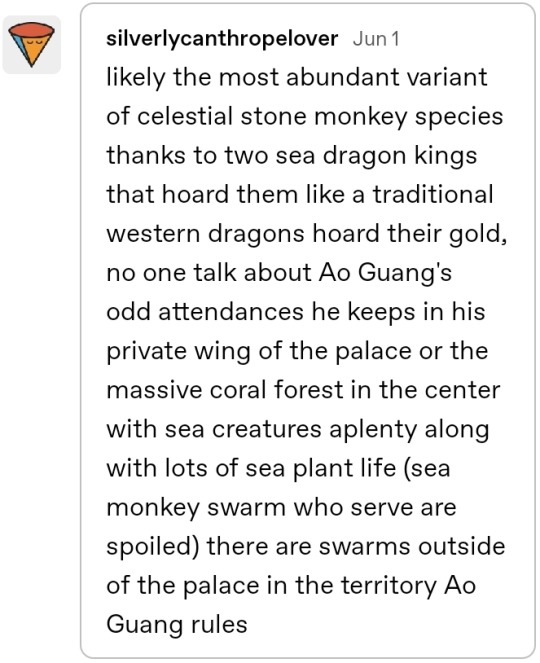
Wukong has no idea that these little spiritual monkeys exist! To think that some Stone/Spiritual Monkeys survived the Great Flood by changing their whole biology, or existed even beforehand, is an amazing discovery!
The Water Monkeys are a lot smaller than Wukong or Macaque, being roughly the size of tamarins. They don't speak "human" languages very well, their vocal cords are more attuned to the calls of dragons and other sea life. They can still chirp and chatter as monkeys do, allowing for some delightful conversation between the Stone Monkey King (they do not recognise Sun Wukong as their king) and the school of excited fairy-like monkeys.
#stone monkeys#celestial primates#jttw theories#lmk theories#jttw aus#ao guang#ao shun#lmk aus#journey to the west#lego monkie kid#fengshen yanyi#investiture of the gods
109 notes
·
View notes
Text
I had to make a whole google doc to sort my thoughts on this, that's how mad I am tbh. My friends have made explanations which you can find here, and here. And while I told myself that after that post I was done, seeing my friend receive a comment like this was the final pushing point I needed.
I'm both going to ramble about Nezha here again, and I'm going to try and explain this in a way that'll get people to understand, as someone who once followed an Eastern religion too + I'm going to be stating my basic thoughts here so maybe some things won't make sense.
Mild info about me: I'm from Trinidad. My family is described with East Indian descent but clearly, I'm not from India itself. My knowledge of Hinduism is rather basic because I quit religion thanks to traumatic experiences related to it, however not lacking fully. From my father's side, specifically his mother, they practice Hinduism and can even be considered devout Hindus (if I'm to believe all the statues and pictures of about almost every single Hindu god). Though my knowledge is basic, understand that I'm not Hindu nor Indian, so of course these are my opinions and my experiences with Hinduism, and I do not advise you taking my word fully to heart. I'm only trying to explain something to the LMK fandom in the best way I know how too, by referencing another Eastern religion that isn't half as popular as Daoism/Buddhism.
There's only one show I know where Hinduism is portrayed, and it's an anime/manga series called Record Of Ragnarok (Shuumatsu No Valkyrie), and from what I know it's not well liked by others (and even banned I think?) because of the fact Shiva is weaker than Zeus and the supposed sexualization of Parvati, Kali and Durga? It's been a while so I could be wrong on this though.
Why am I bringing this topic up to a rant about a lego character though?
#1) Fiction vs Religion and Reality
While one half expresses discontent and discomfort, I've seen others who clearly don't mind because Shiva is still badass and cool. I myself had some qualms about his appearance in the beginning because while I did quit religion, this was a god I used to worship, and seeing him in an anime/manga and be sexualized and simped for was…uncanny, to say the least. Overtime I grew numb to it though because it was genuinely funny and even I, an ex Hindu, found him attractive, and had not much hesitation writing smut about him in past fics.
Similarly, I can imagine this is how Daoists and Chinese had originally felt about Nezha in Lego Monkie Kid [Only referencing LMK with Chinese deities. I'm aware there could be other media where they're in.] A bit weird at first but then overall got used to it because there's genuinely no harm done, as it's not meant to be an educational retelling of a god, but a fictional portrayal of him.
Returning to the point I mentioned with Shiva. When I first came across this series in 2021 (?), I did not feel too happy and comfortable with the image of a deity I've grown up worshipping as a child. I quit religion when I turned 13, so it's been nearly five years since I've had nothing to do with the main religion of my household; Hinduism. Still, I practically grew up worshipping this god I was taught to fear, and seeing a potrayal of him (which honestly in my opinion) didn't seem like a good thing at the time.
Why did I eventually stop being bothered? Because this wasn't supposed to be retelling of Shiva. This was just a character with similarities to the god I worshipped, but wasn't the god. The series I watched wasn't even intending to teach audiences about any of the religions and real life figures they portrayed, they simply used them as inspiration to tell a story. They weren't accurate representations, but that was the point. It's a story about gods vs humans from history; of course it wasn't going to be accurate nor stay true to the figure they took inspiration from.
You can imagine then for a cartoon series meant to sell Legos. Lego Monkie Kid contains several characters that are known in Chinese myths and legends/religions. Of the most popular mentioned, there is Sun Wukong, one of the main characters in the series, Tang Sanzang otherwise known as Tripitaka and the Great Monk, Lady Guanyin mentioned in season 1, the one the fandom argues about, Nezha, the Jade Emperor in season 4, and most recently, Nuwa, and Heavenly Pagoda King, Li Jing. There may be others but these are the ones that are most known within the fandom.
Mind you some of these figures are still very much worshipped now, but, point remains: the series was never intended to be a retelling of these characters stories, nor were they intended to be educational for audiences. They took inspiration directly, gave their own twists, and hence you have the story of LMK, meant to originally promote Legos and then eventually gave way to the series that this fandom belongs too.
These characters are not their source material, nor the origins of which they came from as religious figures. Sun Wukong is a Buddha within JTTW’s ends and if I'm right is still worshipped as such sometimes (?). He didn't hide away into a mountain at the end of his journey. His companions didn't die, nor were they reincarnated, but instead also acquired titles and became Buddhas as well. (Or gods? I frankly don't remember). Tang Sanzang as we've in season 4 was not some sort of brave, astute man in the book but rather a crybaby coward. Need I even point out that Nezha wouldn't have a giant mech to fight people, nor would he have such close deposition with the Jade Emperor? Or the fact that the Jade Emperor would be bested by someone like Azure Lion?
Not even counting Journey To The West and the Fengshen Yanyi, the real Tang Sanzang that Wu Cheng’en took inspiration of most certainly did not have a monkey, a pig, a water demon and a dragon turned horse with him on his journey.
Why speak of all this?
To make my first point; religion and fiction are two very different things. Religion has existed for who knows how long, and fiction has recently decided to include fictional potrayals of these gods into stories and cartoons. From a writer's perspective, it's really interesting taking something that is a part of religion and writing it into your own works, with your own take on it.
And of course, brings me to the topic of Nezha.
Lego Monkie Kid Nezha is, according to an official writer within the show's team, an adult. Although many fans have their objections about this, supposedly because Nezha in other sources is a child god, and think that the writer only abruptly pointed out Nezha's an adult to save her own skin.
Taking all my points in consideration; let me humour the Nezha is a child god idea. What, exactly, does this have to do with Nezha in Monkie Kid?
If Nezha, the god within Daoism and Buddhism, is supposedly a child deity, what law says that any other potryal of Nezha has to abide by this?
By this logic. Shiva in the anime I mentioned above shouldn't be weaker than Zeus. He also shouldn't even be agreeing to fight mortals, as he's a deity far above such petty behavior. Zeus shouldn't be portrayed in books like PJO as a lecherous cheater, because in reality, Ancient Greece consisted of multiple kingdoms and thereby different interpretations of Zeus were merged together which is what consists of the myths we know of him today which is highly disrespectful, and Sun Wukong shouldn't be a mentor to MK, because he's supposed to be a Buddhist, and thereby wouldn't be entertaining fighting nuances.
Fiction doesn't not adhere to reality. The fact I need to say this astounds me because should this not be obvious? Lego Monkie Kid is a cartoon set in some sci-fi futuristic world with lego people walking around, where gods somehow need mechs to go around fighting, and there are animal-like demons/yaoguai walking around here and there. There is literally an arcade in the show with zero gravity. Do you possibly believe for a miniscule second that anything that goes down in a fictional setting will adhere to our reality??
And, even then, humouring the Nezha being a child deity concept > what law says that he has to be portrayed as a child in other pieces of fiction?? Especially when the fictional setting is not meant to be a retelling or for educational purposes, but rather to carry a plot.
There is nothing, no law, no rules that insists that a religious figure must be portrayed as they are in a legend/myth for a fictional world.
Lego Monkie Kid Nezha is not the deity Nezha. He is a completely different character, which many of you should have realized from the exact moment he was brought into the show. They are not the same person. Never was.
“Oh, it's disrespectful―” From a writer's perspective, I personally don't think so. If I wanted to make a story that involved a god, I wouldn't keep everything that makes that god who they are. There are some key points I would keep to make the story, but I would ultimately create an OC that shares some attributes to this religious figure, but it wouldn't be him. The show Record of Ragnarok does a good job with this in my opinion, because while many characters share some attributes to the real figures they're inspired by, the writers changed several things to create a proper story, and thereby making these characters OCs and not the actual gods themselves, and of course that logic applies to Lego Monkie Kid.
In the instance, again, Nezha the god from Daoism, is in fact a child deity, Nezha in LMK isn't. Nezha in LMK is someone who's entirely different from the god himself.
So, the logic this fandom uses confuses me a lot. Do you not understand how to seperate fiction from religion?? Do many of you not understand media literacy, and what a writing process is like?
Sigh. Moving to another point―
#2) Character Designs
Sometimes, when it comes to character designs, anyone could just throw them into anything and think, “Yeah that's good.” Not much thought is given to a character's appearances depending, which I don't really blame as someone who's 1) done literature as a hobby and has seen my fair share of character designs, 2) creates characters myself. It's too hard thinking of a character's appearance, and even then when making them there normally wouldn't be any significance.
Nezha's design in LMK seems to be a huge source of debate when arguing about his age. It was actually brought up in my previous post, specifically that his hairstyle was often used by children at the time.
I have a bone to pick with this point.
This is Nezha from Lego Monkie Kid:
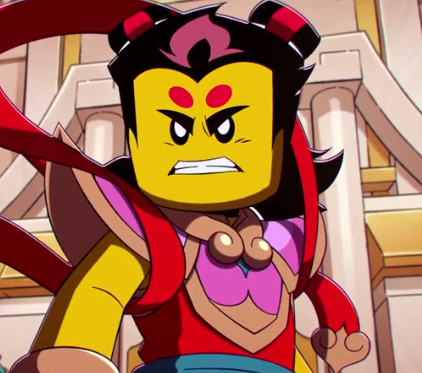
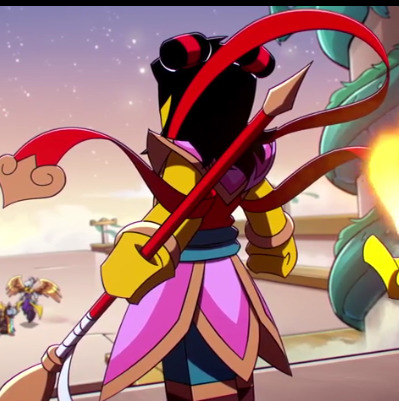
However, this is Mei from the same show:
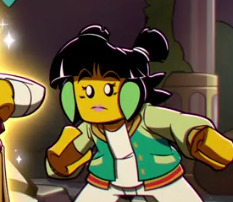
Before anyone starts, allow me to point out as a history geek that likes religion and pointless facts over politics: I am aware that there are different hairstyles to show certain things, including one's age and status and sometimes even personality. Do not bring up any points about the differences in these characters hairstyles with an excuse, “Oh, but you should know―”, because I know how hairstyles could be treated within history.
However. Look at Nezha's hairstyle, and then Mei's. I've never seen the LMK fandom complain about Mei's age, because it was generally believed that MK and Mei are both at least 18 if not older, as the legal age for a driver's license in China is 18.
Both Nezha and Mei are wearing a ‘bun’ type hairstyle. Mei's is arguably more of twin ponytails (?), but I'm not a hairstylist, so I don't know what they're called. To me they look similar, that's all I'm trying to say. And even if they weren't though―through a modern lense, a hairstyle isn't reserved for just any specific age. Anyone can wear a hairstyle they want. Keep in mind that the creators of LMK are also Western(?), and they chose a hairstyle for these two characters based on personality and appearances.
A hairstyle is not reserved for any age. Grown women including my aunts have worn hairstyles similar to these just for fun.
That's point one.
Point two; Nezha is a very popular deity, much like Sun Wukong. In terms of recognition, Sun Wukong is very easy to recognize because of his staff and his overall cocky personality.
Nezha however is an entirely different case. Most media potrayals of him always has the two-bun hairstyle of him, which is what makes Nezha recognizable. If you remove that specific hairstyle of his, you won't recognize him. It's iconic, and pointed out in this scene (The Legend of Hei) where Nezha makes an appearance as well.
youtube
[Characters sitting together. White haired boy (Hei + MC) looks at the older, dark haired boy (Nezha). Nezha looks back.]
Nezha: What? You want an autograph?
Hei: You're a boy?
Nezha: Yeah?
Hei: Your hairstyle is cute.
[Nezha looks in front with an annoyed expression.]
Nezha: If it weren't for the recognizability, I'd have changed it long ago.
Hei: Recognizability?
[Nezha removes the buns(? some form of them?) from his head. Three older figures glance at him.]
???: Who are you?
[Scene returns]
Nezha: See?
Aka, point being made: those buns are what makes Nezha recognizable. If he doesn't have that hairstyle, unless it's specifically pointed out, I'm certain majority would not recognize him.
Some hairstyles are meant to be done for some form of meaning. But sometimes, as is the case with designs, they're just there just because no one wanted to make the characters bald. Using the excuse about Nezha's hairstyle to justify his age as a child is by far the lamest and dumbest excuse I've ever heard of, because the creators did not give him that hairstyle for the sake of some meaning anymore than MK was given his current hairstyle either. It's his logo at this point, ignoring his color scheme aside.
Even then, if the creators of Lego Monkie Kid intended for Nezha to be a child within the show, he would not appear as he is. Lego Monkie Kid has made children models, which we can see here (used from s3 and up in case someone tries to excuse the differences in seasons):
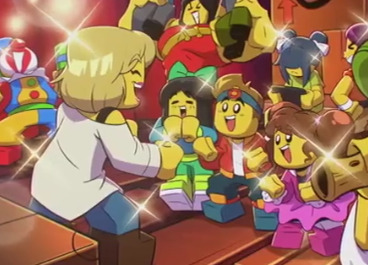
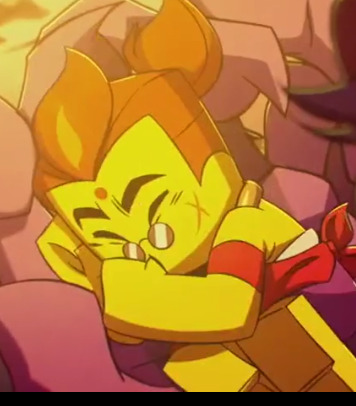
And of course, Nezha's model;
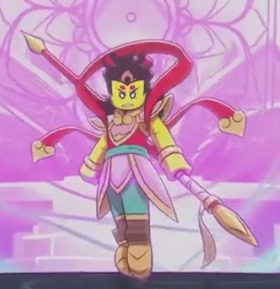
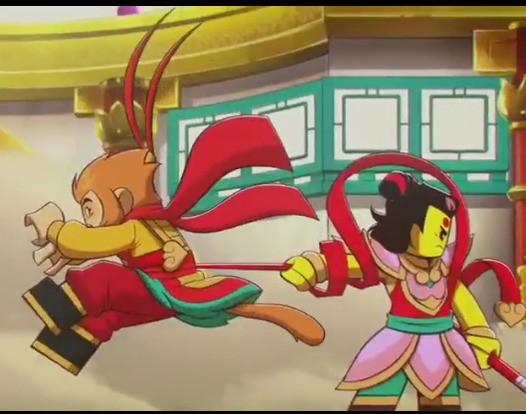
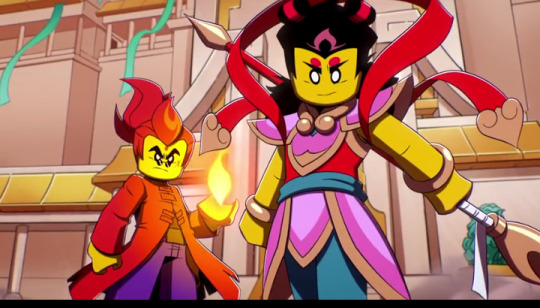
Despite the perspective and low quality though, he's at least the same height as Red Son here:

If Lego Monkie Kid truly intended for Nezha to be a child, his appearance and model would be similar to the children's in the show. Perspective is difficult to find but you can clearly see he's about the same height as the other adult characters if not taller, and is not small like the child figures we see.
Pink isn't a children's color, and nothing about Nezha's clothing indicates a child. He very much looks like an adult and doesn't exhibit childish behavior as we see Red Son, Mei and MK do.
I've seen fans use his voice to point out he's an adult, but I'm not sure that's a valid point. I say this as someone who has a 13 year old brother and was recently a minor myself.
Allow me to clarify: a voice isn't a clear proof of age. My father is a 45 year old man but sounds very much like a woman/teenage girl. My brother is 13 and sounds more of an adult than his father. My classmate in highschool was one year older than me and his voice was very high-pitched.
The voice actors in LMK are directed to speak a certain way for a reason…in English. I'm not sure about Mandarin. In my opinion, Wukong's voice sounds like Son Goku's because it's a reference to the fact Wukong is what inspired Goku. Nezha's probably sounds deep and brooding not because he's a child but because it almost represents his own personality, and probably is a reference from another shonen protagonist Ichigo Kurosaki. MK's voice in the beginning sounds really childish to me but slowly as the events of s3, 4 and 5 happen it gets more deeper almost as a reference to show how his ‘innocence’ is slowly fading.
Or, I might be looking to into it. Regardless, tdlr, don't use Nezha's voice in your argument. I've seen grown ass men have high pitched voices.
Returning to my original point however; if you have an ounce of media literacy and understanding, you should be aware that some character designs are chosen for a reason. Nezha's icon is those two bun hairstyle, and the writers purposely chose it so old fans/readers of JTTW and FSYY and maybe other Chinese/Daoists would be able to recognize him and go, “Hey, that's Nezha from―”
Before I got into LMK, I read JTTW and also saw The Legend of Hei and the Nezha 2019 movie, so I knew him because of the hairstyle. And my first instinct of course was to point out, “That's the dude from TLOH!!” when I saw him. So, the hairstyle was chosen for the recognizability, and I highly doubt as a sign of age.
Even then, LMK Nezha aside, moving on to a different point.
#3) Sources Of Inspiration
The 21st century isn't really the first era where people are taking inspiration from other cultures. As a matter of fact, it's been happening for decades, and it's very prominent in religion, which someone of you would know if you both a) actually did proper research, b) gave a shit about what you're researching and c) studied history.
Hilariously, I have done all three of the above.
I'm going to use a popular example here with Sun Wukong and Hanuman. Hinduism is supposedly largely considered one of the oldest religions in the world. If you truly think about it, certain Daoist deities are loosely inspired or are versions of Hindu gods, which I'm going to use here with a popular example (and provide a link too).
― Sun Wukong and Hanuman. The earliest Vedic records mention one of the supposed known monkey gods, and their similarities make scholars suggest Hanuman inspired Sun Wukong. Specifically his figure in JTTW, where it's speculated that the author must've had a copy of Vedic (?) hymns. While Sun Wukong does predate JTTW, Hanuman definitely has had some influence on him.
Much, much similarly, the deity known as Nezha, is also loosely inspired/based off the figure known as Nalakuvara, who appears in Hindu and Buddhist mythology, and often appears as a sexual trickster figure in Hindu and Buddhist literature.
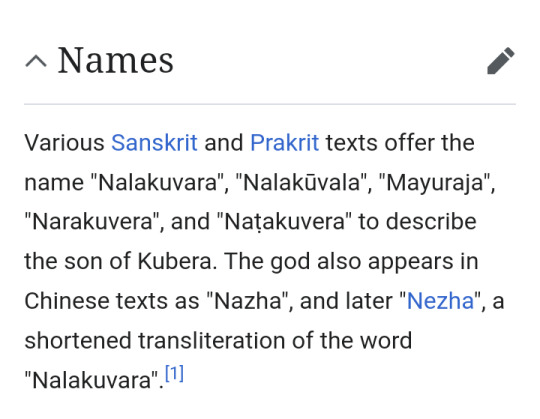
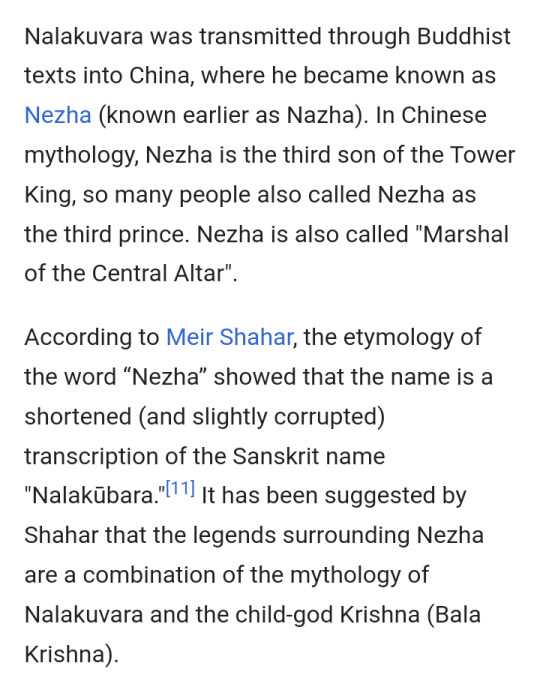
Historically speaking, when it comes to religion and myths, something many people fail to understand is that before there was the idea of writing to tell a story, there was the process known as sharing from mouth to ear. Not in a literal sense, but rather that people often preferred to tell stories via word of mouth back then, and as things always go in history, there will be changes. The proof is literally right there. Nezha was originally known as Nalakuvara, yet when transmitted through Buddhist texts, he became known as Nazha, then Nezha. And as such, the Lotus Prince and Chinese god known as Nezha was created. A combination of Nalakuvara and the child god Krishna.
A lot of people will want to jump on that specific point that mentions Krishna being a child god, so allow me to immediately put you down right there.
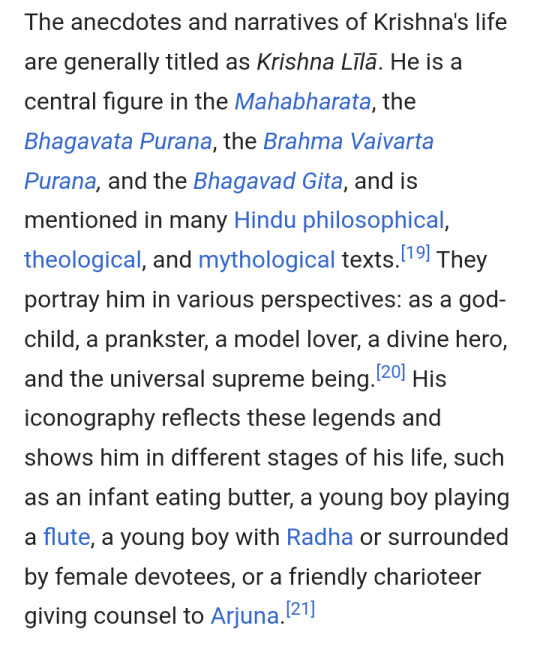
Ex Hindu here; I did not even know there was a portrayal of Krishna as a child. Up until I stopped practicing Hinduism, I used to worship Krishna as an adult figure. In the paintings and statues my aunts had for Diwali as a child, he was always showcased as an adult.
Ironically, doesn't this apply for the actual god Nezha too?
When it comes to religion and myths, many of you forget something very important; there is no such thing as a canon iteration. These aren't shows, these are stories from the past told through different people, and passed through many hands. There is no such thing as a canon version because almost everyone had their own version of a myth or story. Terms you may typically apply to fandoms don't apply to fucking religions and myths, and some of you are so chronically online that you forget it.
#4) The LMK Fandom's Chronically Online Attitude
I'm an ex Hindu who still faintly remembers some bits and pieces from my childhood while practicing this religion, especially during the Diwali period, where little me managed to get new information from library books about the gods my family worshipped. I personally didn't like sitting during the priest's (forgot what he was called) chanting though but the funny white thingy we used to have to wear was fun.
There are some Hindu gods I'm familiar with, like Lakshmi, Kali, Durga and the other versions of her (I still can't recover from the one statue with her in a fish..) Parvati, Shiva, Vishnu, Hanuman (yaah), Rama and Sita, Ganesh (also yah) and of course, Krishna. I also have watched my fair share of childhood movies and cartoons where the gods were mentioned or present―Karan & Arjun specifically struck the fear in me with Kali 😭😭 holy fuck that movie scared me with the creepy edits jeez T-T. There was also that one cartoon about Rama and Sita”s story specifically Hanuman, and this Indian TV series where this little girl was a loyal devotee to Ganesha (I had no idea rats were one of his uh signature animals holy shit).
I'm rambling here a bit because the childhood memories were fun, but the point I'm going for is though….
I am familiar with these gods I grew up with. And I know about them, maybe not enough but certainly enough to know how to properly respect them from back then.
And, using Krishna as a prime example; if someone came up to me, or I came across anyone, who argues that the god I know is an immortal child, even though I have worshipped and adult version of him, I'd be so fucking pissed. Krishna is seen as an adult, I worshipped him as an adult, but there are cases where he's a child god, and that's fine! But to have someone tell you that you're wrong about the god you know about because they got some basic information off the internet, undoubtedly, I'm going to be pissed. Especially when it's from a Western fan who has no fucking brain.
So, of course, imagine how devotees of Nezha and Chinese people must be feeling every single time this fandom fucks about with Nezha's age. I saw it myself; people told my friend that a) she was lying and b) her statement is irrelevant just because “I did my proper research, and even if you're Chinese you can still be a proshipper, Nezha's a child deity.”
It's genuinely so fucked up to me how the LMK fandom act towards Nezha's age. You guys will ignore the people who are willing to provide accurate information for the sake of being in the right and accusing people for being a proshipper over a deity they have more experience with than you, a Western fan who has no knowledge of Eastern religion.
It's insane. There are actual Daoist and Chinese who are pointing out the fact Nezha isn't an immortal fucking child.
You're not only disrespectful, you insane, childish and most importantly chronically online. Nezha the god isn't a fictional character, there's nothing ‘canon’ about him. He's a god who's lived for decades longer than you, and his existence predates yours. People have long sinced worshipped Nezha, and the fact that you can so boldly tell someone they're wrong about the god they've worshipped is so disrespectful.
Do you not realize, as Nezha is worshipped as a child, he's worshipped as an adult? Do you not take into account how absolutely disgusting and horrible you are telling Daoists and Chinese who have stated time and time again the information of Nezha being an immortal child is factually incorrect that they're wrong and know nothing??
I'm repeating my statement; I'm an ex Hindu, but if anyone told me that Krishna's an immortal child too and then point out I'm wrong and my point doesn't matter, I would be seething. And I don't blame my friend who's losing their temper about Nezha's age.
What amazes me though, somehow, is the fact that. If anyone who was Chinese + Daoist agreed with your claims, as Cole from Twitter once did, none of you would've spoken that way to my friend. But of course, once she points out she's Chinese/ex Daoist and disagrees with you, majority of the opinions switched because, she wasn't agreeing with your headcanon, right? So even though she's Chinese, she's bad because she disagreed with you.
You're all disgusting and fucking weird.
And the fact y'all in this fandom will habitually prove yourselves as hypocrites by attacking people, and then ignoring the ones who are capable of proving you're wrong to cling to a false idea is insane. You guys need some actual help, holy fucking shit.
Nezha isn't an immortal child. That's a god. If he was intended to be a child in LMK, there would've been statements about it.
Seperate fiction from religion, and seperate your headcanon from canon and the actual god. If you think this biased headcanon is okay and attacking people that point you out for being wrong is somehow okay, I sincerely ask that you take a break from the internet, and read a book.
No, don't just read a book. Read a history book. Pick up some knowledge, understand how religion and history works.
Furthermore. The research some of you guys are doing is actually shit, by the way. You guys aren't researching properly if you can pull up with Nezha is 12, thing. If you actually cared about his age, you'd put more effort and actually stop being disrespectful to the people who are giving you the proper information. You only research surface level so you can attack people.
And additionally, stop playing the Devil's advocate. Most of you are just Western fans who think you know everything from reading one book or watching one show. You read JTTW or watch OSP’s videos and suddenly, you know more than an actual Chinese person or Daoist. You look up Wikipedia and think, “Oh yeah, I'll go with this!” And that's it. Most of you at best can provide only three websites at most, and I can bet my ass that these websites with information about Nezha's age was written by a fan who got their information from a shit source.
I love History, and most specifically, I love religion. Not so much the divine aspects as it is about the myths that surround it. Whenever I get into a fandom, I need to find out more about their religion and history. Getting into JTTW, and eventually, LMK, pushed me into a rabbit hole of Chinese myths that I really enjoy learning. But dealing with idiots who think they know more?? It's sickening as shit.
I'd like to think I'm good at literature things because once it's a religion or myth I want to learn everything about it. But I know I don't know everything, and I know especially I have more to learn. I'd never tell someone who is a part or worships the religion/culture I'm learning that they're factually incorrect about it just because I have an opinion and I learnt my info from a random source.
You guys in the LMK fandom are incredibly entitled. The Nezha is 12 controversy is a headcanon, which became worst by that asshat Cole on Twitter. And because so many of you don't want to learn the truth, whenever someone tries to point out and help you, you ignore them or attack them, and deny their heritage.
And honestly?? You guys suck.
And this is coming from me!! Some of y'all are grown ass adults too!! And yet I'm childish and immature!?!
Brother I literally turned 18 a few months ago, yet I'm 100% certain I'm not throwing a blasted hissy fit over a fucking god the way some of you all who are most definitely adults are doing.
And finally, the one thing that actually does make me laugh is because I'm pretty sure most of you didn't do History classes. One of the most important things my history teacher taught me is; don't use Wikipedia as a source of viable information. Thousands of people are capable of accessing Wikipedia and changing information as they want, and so it's much better to find book solid resources from libraries. I did in fact use Wikipedia too (hypocritical of me yeah) so of course I wouldn't advise using the screenshots I provided from Wikipedia as evidence to the argument, because anything on Wikipedia can be changed. If I'm feeling extra petty I could change something myself to be in the right.
Furthermore, if you dare to bring up only JTTW and FSSY as a plausible argument about Nezha's age, I'm genuinely going to throw hands and fuck your mother. I think my friend also mentioned it in their posts but I'll mention it here too; JTTW does NOT state Nezha's age. I've read JTTW, and aside from Wukong vs Nezha there's nothing else that states Nezha's age. For all we're aware of, Wukong called Nezha a kid just out of spite, and I do it too when I'm arguing with someone. FSSY is the Investiture of the Gods and the ORIGINS!! Do you THINK a book about the ORIGINS of the gods would focus on other aspects about them!!? No!!
I expect some of the arguments I might get are;
"Oh, Nezha [appearances] could be wearing a glamor!" That is a headcanon, as we see nothing in LMK to refute that. Macaque's scar is canon because it's shown within the show. Nezha's appearance has NOT fluctuated since he was introduced. The idea of him using a glamor or illusion is a HEADCANON unless proven by the show. And headcanons are NOT vital.
"But you use Wikipedia too :(" Which I pointed out and made aware of, which is I also doubt that source myself. If any of you did History, your teachers are supposed to INFORM you that using a website is NOT a good idea for backing up information, and it's much better to use books or other trusted sources. In the case of Nezha, I'm trusting actual Daoists/Chinese who knows more about him than I do. It's because I did PROPER research that I even came across a good source of information, aka @ruibaozha, who I'm sure can share more light on this than me! The fact that some of you guys won't even acknowledge them is almost proof that...you're clinging to a headcanon. Jackass.
"But Nezha in JTTW/FSSY are 7/12 and that's where LMK takes it's inspiration from so obviously―" We've seen for a fact LMK does NOT follow JTTW to the letter. Jade Emperor beating Wukong?? Lady Bone Demon being a powerful foe and being trapped in a bunker? Azure even being able to kill the Emperor? Majority of the LMK fandom likes to point out that LMK Macaque and JTTW Macaque are two different people, especially when you claim that Macaque is a bad character because he cannibalized the monkeys. So then, with this logic, JTTW Nezha, FSSY Nezha, and LMK Nezha are also three seperate figures. I swear someone made a post about the differences JTTW and FSSY Nezha have too, but I can't find it so meh. The point still remains though. LMK Nezha are two different people, you're not making any sense to me about that argument. Even then, LMK isn't taking direct inspiration and putting their own twist. Who says anything needs to be accurate??
"The writer only said Nezha's an adult to ship lotuspeach!" Are you faintly aware people, actual Chinese people, have shipped these characters together? Proshippers can come from anywhere but I genuinely doubt every single person is a proshipper because of course, they're aware their god isn't an eternal child. On top of that, in a situation like this another writer would point out that Nezha ISN'T an adult. No one has argued against this claim, so why persist? Where's your logic coming from if not entitlement?
I want this to be the last time I have to talk about Nezha, because I made my blog to write porn and me smooching my favorite LMK characters. I kinda don't really like making discussions like this because that's not the point of my blog.
However...I do like rambling. A lot :)))
Anyways, point blank. LMK fandom needs to grow out of this entitled mindset and stop ignoring the facts from experts. You guys are just being annoying at this point.
My argument isn't really valid tbh, just pointless rambling because I only know basic information. I think you guys should find proper information from accounts online.
Also, if you're gonna argue: don't bring be albeist, racist etc etc. I'm capable of cussing you out without bringing up your mental health, race or identity :)))
#lego monkie kid#monkie kid#lego monkie kid x reader#lmk nezha#nezha lmk#fengshen yanyi#journey to the west#jttw#fssy#third lotus prince nezha#monkie kid nezha#nezha monkie kid#lego monkie kid nezha#nezha#nezha x reader#sun wukong#lmk sun wukong#monkie kid x reader#lmk macaque#lmk sun wukong x reader#fssy nezha#jttw nezha#uh#i should defo make a tag uh#† sagii's analysis#the legend of hei#nezha fanart#sun wukong x reader#Youtube
98 notes
·
View notes
Text
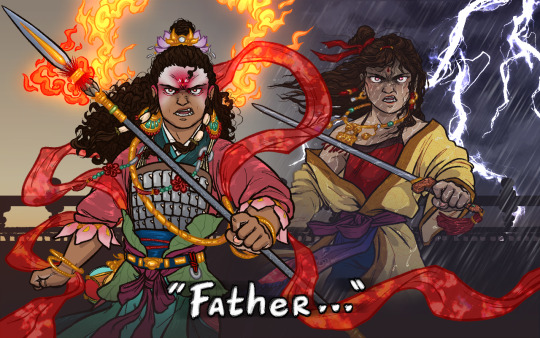
Prodigal son terror
Li Jing in a fury grabbed his halberd, leapt on his horse and galloped out of the headquarters. He was astonished to see Nezha with his Wind-Fire Wheels and Fire-Tipped Spear. He swore loudly, "You damned beast! You caused us endless suffering before your death, and now that you've been reborn, you're troubling us again!"
"Li Jing! I've returned my flesh and bones to you, and there's no longer any relation between us. Why did you smash my golden idol with your whip and burn down my temple? Today I must take my revenge!"
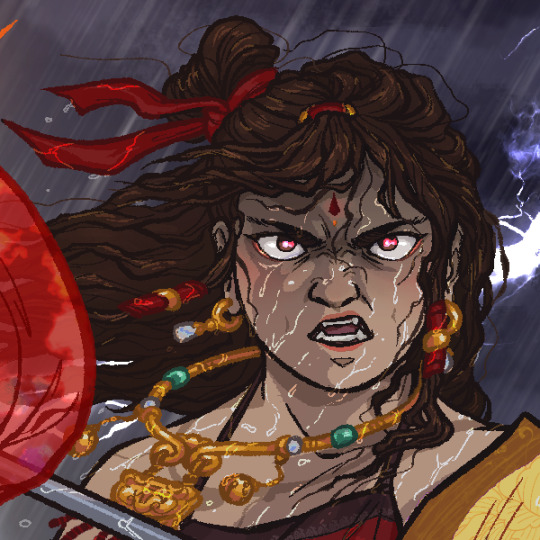

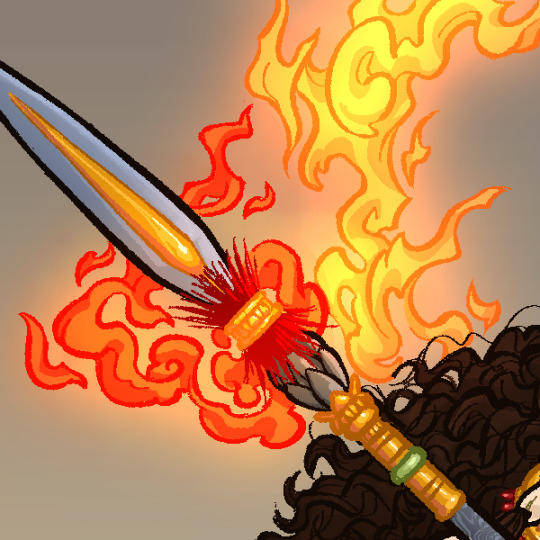

since I'm on a Nezha streak, might as well do my design for him on the Expedition AU! given that i've chosen to give characters a closer likeness to their region, it's only fitting i do the same with import deities like Guanyin, Subodhi and Nezha.
he's a complicated figure to place in the timeline because he gained popularity as a deity much after, only really arriving in China by the time the Journey would have been set. FSYY was written closer to when JTTW was written down, and he was retroactively inserted on the Zhou Dynasty period.
so deciding what to even do with him is dicey. but then i said fuck it, mythological rules apply here, he was around for the events of FSYY, and it and JTTW are set in the same universe. and for the sake of having some fun, i decided to get funky with his concept.
Nezha had the likeness of his family when he was alive, as described in FSYY, but once he was reborn with a lotus body he gained Indian traits instead. this is to be a nod to his status as an import deity and his origin as Nalakubara, and as the centuries roll by he may present himself to mortals closer to the locals' appearance wise.
as for his looks, i drew inspiration from multiple sources. read more for my rambles <3
his armor is closer to reconstructions of Zhou dynasty-period armor, skipping over extra parts simply because his lotus body is so indestructible, there's no need for a full set;
there are two red Chinese knots with jade beads dangling from the armor ties. they are said to ward off evil spirits, which felt like a good fit for a guy known to banish demons. i picked a six-petal flower pattern, which represents reunion, unity and a bright future;
i included lotus petals and leaves on his outfit as they are common in Beijing Opera outfits for him, and his makeup is a call to it as well;
The pink from the cheeks and eyeshadow seeps into his ear shell, as to convey the way sometimes, you get so angry even your ears blush;
Another thing i referenced from Opera is the two red ribbons on his sidelocks, though I changed them to two bulbs of lotus roots;
Four petals drawn close to his urna as both to make it look like a lotus but also form five petals, which is an auspicious number;
His hair crown is a fancy princely [knot] with a lotus motif and a pearl in the center, as he was the Pearl Spirit before becoming Nezha;
I was going to go with elf-like ears but I thought I could do better, so I went for stretched earlobes instead. you can't see it that well but hopefully the very large golden earrings imply it well enough xvx;
His cheek dimples are common sight on religious images of him and it was a cute touch imo;
Younger Nezha wears a golden robe because of his title as General of the Central Altar in Daoist belief, and the center direction is connected to yellow or gold, and yellow robes are usually meant for emperors and their sons, which is a minor nod to his self-assureness and boldness;
The Cosmic Ring has spiralling grooves on it both to catch blades on it for defense but also as a callback to Opera props;
On his waist is the embroidered ball weapon he was attributed with in earlier myths, he was also meant to have the leopard skin bag Taiyi Zhenren gave him, bjt it was going to be obscured by the text so i omitted it;
A few depictions of him gave him a halo of fire, which was real cool so i added it as well.
#fengshen yanyi#investiture of the gods#fsyy#iotg#li nezha#nezha#third lotus prince#third prince nezha#expedition to the west au#bell dragon art
431 notes
·
View notes
Text
according to fsyy, li jing’s pagoda was originally given to him to use in self-defense from a patricidal nezha, and chinese netizens like to joke that he keeps it around because he knows it’ll be over for him once nezha notices it’s missing 💀
in the lady earth flow arc of jttw, when nezha uses his sword to stop li jing from attacking sun wukong, li jing PALES in fear because he thought nezha was going to betray him and he didn’t have his pagoda around to protect himself
of course nezha isn’t trying to kill him; he was stopping li jing from killing swk (because swk was gonna take him to court LMAO). and today i saw some c-netizen comments on XHS and i wanna summarize them because oh man 😭 :
nezha has moved on from their feud, but li jing will be haunted forever. the pagoda isn’t just for his protection; it’s to remind him of the consequences of his actions because he can never put it down, not unless he wants to risk getting attacked again. he’ll be forced to carry that pagoda for the rest of his life
#the way he gets so scared in jttw when nezha stopped his sword cracks me up every time 💀💀#as someone who laughed the entire time i read nezha’s backstory in fsyy because it reminded me too much of my own father#this interpretation (the last paragraph of my post) makes me very happy :)#li jing isnt cunning or malicious but he is VERY impulsive and trigger-happy#and this is his consequence 👍 he never gets inner peace LMAO /hj#jttw#journey to the west#fsyy#fengshen yanyi#investiture of the gods#nezha#chinese mythology#li jing
61 notes
·
View notes
Text
Oh no ...
Someone aware of my recently-finished catalog of Sun Wukong's powers and skills indirectly requested that I make a list of powers from Fengshen yanyi (封神演義, c. 1620).
But I don't have the mental energy for it. Plus, I am not as familiar with the book as I am JTTW. I'll pass the torch onto someone else ... COUGH @ryin-silverfish COUGH.

#journey to the west#jttw#fengshen yanyi#fsyy#list of powers#magic powers#twitter#sun wukong#monkey king#magic#chinese magic#taoist magic#daoist magic#buddhist magic#pass the torch
68 notes
·
View notes
Text
I love the idea of a Nezha retelling instead of being told like a myth it’s told like fiction, putting more focus on how it would actually feel to be in these situations.
I want to see Li Jing come to terms with the fact that his youngest son, his baby boy, ripped out the spine of a dragon prince with his bare hands. I want to see the horror on his face as he stands face to face with a dragon king and realizes that Nezha has doomed them all.
I want to see Nezha throw a tantrum (like any child his age would) screaming that it wasn’t fair, that he shouldn’t be punished for defending himself.
I want to see Lady Yin make a temple for her baby and I want to see her cry as her husband burns it to the ground
I want to see Nezha as both a hero and a monster, reconstructed as a zombie made of lotus and spite, riding on wheels of fire towards the father who now refused to call him son, who let him sacrifice himself when he was far to young to understand the weight of his actions. Who shunned him when all he needed was a father to tell him what to do and how to fix it.
I want to see Nezha’s story as not a tale of Confucianism or heroics, but as a cruel reminder of what happens when we give children the power and responsibilities of adults.
Or maybe I should write it myself
#nezha#li nezha#nezha conquers the dragon king#nezha lmk#chinese mythology#chinese folklore#mythology#mythology and folklore#myth#folklore#mythology retelling#nezha 2019#nezha reborn#fsyy#investiture of the gods#fengshen yanyi
139 notes
·
View notes
Text
Nezha in the Qing FSYY Guci
..."FSYY Nezha is sooooo violent and nasty!" is rapidly becoming my new pet peeve in online discussions, not least because Novel! Nezha has nothing on Guci! Nezha when it comes to violence and belligerence.
"What's a Guci?"
Literally "Drum Lyrics", it's a type of folk storytelling performance that originated in the Ming dynasty and was quite popular in the Qing dynasty. Essentially, one or two people sing and recite the story in public, accompanied by either drum beats and clappers or string instruments.
[A modern example: Fengshen Bang, Wenzhou Guci performance]
And there's a lengthy (1.3 million characters!!) Guci adaptation of FSYY in the Chewangfu manuscripts. It was composed during the reign of Emperor Tongzhi (1862-1874), and likely performed in Beijing due to in-story references by the storyteller.
It is also fucking feral.
Like, FSYY novel and the Qing royal opera adaptation are written by literati and palace playwrights respectively, and thus are more tame and Confucianized in tone, while many later folk operas and plays have that "I won't hesitate, BITCH" vibe to characters and scenes.
It is a natural consequence of adapting the story for a folk medium, because:
Most of your audiences were likely illiterate and would neither get the poetry nor the literary references,
You needed to capture their attention quickly through melodrama, violence, and crass humor,
The scripts were often even more repetitive and formulaic, because the storyteller needs that as a mnemonic device, and the audiences should be able to jump into the story without having listened to previous sessions.
Which is why everyone in the Guci seems so eager to throw hands, some of the violence can get more graphic than the novel, and even kings and ministers swear like your average urban dweller.
…In a sense, the adaptation of Nezha's story is pretty representative of the Guci's tone as a whole.
(Disclaimer: everything below the cut is a general summary and definitely not a literal translation.)
Guci Nezha: Chapter 84-101
-The Guci actually shows Taiyi wrapping the Armillary Sash around Lingzhu Zi's soul and putting the Qiankun Ring on his shoulder, which is a neat detail.
-Though Lady Yin doesn't take Taiyi's presence in her bedchamber well in the novel either, here, she's like "The fuck are you doing in my bedroom? You must be a bad guy!" before calling out for her servants to grab weapons and ropes and block the door so the creep won't get away.
-In response, Taiyi strikes her bed with his palm, resulting in a resounding crack and Lady Yin calling out for her husband in fright, which wakes Li Jing up.
-After Lady Yin tells him about the strange encounter (he interpreted it as an auspicious sign), she immediately goes into labor, and Li Jing goes into the courtyard to burn incense and pray for her and her kid's safety.
-It's actually a pretty nice explanation for his absence when the baby turns out to be an orb of flesh that immediately starts rolling around the room and scaring the servants.
-Upon being informed of the bad news, Li Jing cut open the orb, revealing the baby inside. And he nearly strikes the baby too, before going "This is clearly a baby and my kid, how could I just stab him?"
-Then Lady Yin wakes up, they have a pretty sweet familial moment, and just when one of the elderly female servants is about to carry the baby away, he jumps right out of her grasp and begins to run around the room naked.
-Li Jing finds this pretty funny, picks up the baby, hands him over to the elderly servant, and makes her his nanny.
-Yep, Nezha has a nanny in the Guci, and she and her husband kinda function as surrogate parents while his real parents are busy training soldiers to deal with Jiang Wenhuan's rebellion.
-Also, I love that Taiyi's reaction to Nezha's hour of birth isn't "Damn, he's destined to break 1700 prohibitions against killing" but "Great! 1000+ violations of prohibitions against killing! Does he have a name yet?"
-After a 7 years timeskip, Nezha decides to take a walk in the city, accompanied by his nanny's husband, Li Zhong. Because it's summer, they are soon covered in sweat, and Nezha suggests that they go out of the city proper.
-Li Zhong advises him against it because Lady Yin tells them to go early and return early, and Li Jing won't be happy about this, they could always tour the surrounding countryside tomorrow.
-Nezha is like "C'mon, I won't get another chance tomorrow, if you won't go, I'll just go myself." before marching out of the east gate.
-Having no choice, Li Zhong scrambles after him, and Nezha actually feels kinda bad watching the old man huff and puff while trying to catch up with him, so he sits down, tells Li Zhong to take a break, they'll go together.
-Nezha sees a distant water body, and asks Li Zhong what it is. He answers that it's a segment of the Jiuwan River connected to the ocean, and because dragons often appear when people pray there during droughts, it's also called the Hidden Dragon Lake.
-Nezha, finding the heat even more unbearable after more walking, is committed to taking a bath there, despite objections from Li Zhong that swimming in such a deep pool of water is a safety hazard.
-Then he uses his sash as a bath towel and shakes the palace of Ao Guang——but not the palace in the East Sea, just a separate summer palace he and his family reside in. It's kinda the equivalent of a vacation cabin for dragons.
-Li Gen the Yaksha doesn't attack because he gets sassed, but outright jumps to lethal force the moment he sees Nezha, and in return, Nezha snaps his trident in half with a strike from the Qiankun Ring, before chasing the guy all the way to the dragon palace's front door and bashing his brains out.
-Terrified, an Old Turtle of the palace orders the soldiers to shut the palace door and cover the compound in "iron webs", before informing the Dragon King about the matter. Ao Guang wants to check out the brat himself, Ao Bing volunteers to go in his stead, yadda yadda.
(Ao Bing is also described as a golden dragon in this version.)
-Meanwhile, on the shore, Li Zhong just sees him being attacked by the Yaksha before disappearing into the water and is freaking out, thinking the kid has died and his parents have only the babysitter to blame, before deciding to inform them anyways so the kid's body can be recovered.
-Obviously, Lady Yin doesn't take it well, and tries to tell Li Jing the bad news immediately, before Li Zhong persuades her into ordering some of the sailors at the pass to fish up the body first.
-Back under water, Nezha points at the iron web and is like "Fight me you asshole eels!" before Ao Bing and the Old Turtle come out.
(Ao Bing's human form is described as having "blue face + red hair" and pretty monstrous looking, which is kinda close to the Shangmei and most Lianhuanhua designs.)
-The moment Nezha sees them, he's like "This daddy doesn't kill nameless opponents, tell me who you are so I can start decimating you!"
"I'm Ao Bing, courtesy name Jingwen, Third Prince of the East Sea! Our palace just gets shaken, my Yaksha is killed, and if you are behind it, kid, you are DEAD." "Bitch, this lake is in Chentang Pass territory, I have the right to take a bath here without getting attacked by some monster! Now that y'all pissed me off, I'm wrecking your place!" "How dare you! I'm a formal god and it's MY subordinate you just killed! After avenging him, I'm gonna go to Chentang Pass and sort it out with your stupid old man!" "Oh, that settles it! This daddy ain't afraid of you, I'll kill y'all before you can do anything to me!"
-After a few rounds, Nezha is concerned that Ao Bing will try to run back into the palace if he's losing too badly, and decides to feign a retreat to lure him to the water surface.
-The trick works: just when Ao Bing is about to run back, Nezha breaks the hindlegs of his steed and knocks his swords out of his hands with his Qiankun Ring.
-Ao Bing shifts to his true dragon form, first to fight and then to flee back to the palace. It doesn't work, because the Armillary Sash of the Guci can apparently set people on fire, as Ao Bing found out the hard way.
(In the novel, it just looks like balls of flames when unleashed and doesn't do fire damage.)
-After bashing his brains out with the Qiankun Ring and pulling out his tendons, Nezha returns to the palace gate to give a message to the Old Turtle that's basically "I'm Nezha, I killed that little bitch, and you better move your palace in three days before I wreck it!"
-The Old Turtle, who's this comical cowardly figure, is so scared that he retreats into his shell and rolls all the way back to Ao Guang to inform him of the bad news.
-Ao Guang doesn't like the Old Turtle either, which is kinda baffling when he still puts the turtle in charge of organizing Ao Bing's funeral before marching out to find Li Jing, and the Old Turtle's reaction is "Great! I can embezzle a lot of money out of this!"
-As much as it may seem like a subtle indication of Ao Bing's overall level of popularity among the dragon palace staff, it is not and also pretty random.
-Anyways, the sailors are finally led towards the shore by Li Zhong, just as Nezha emerges from the water and starts to make his way back. They initially mistake him for a ghost, before finding out he's very much alive.
-Nezha tells them about the whole story, and Li Zhong is like "Yeah, definitely don't tell your parents *that*, just say you are saved by miraculous divine intervention or something", and Nezha is like "Of course!"
-Lady Yin is rejoiced about his survival, and tells her servants not to say a single word to Li Jing about this incident, before preparing a meal for him. She does tell him to never go out of the house again and only play in the back garden from now onwards.
-Nezha also takes the tendons back to the family mansion to, uh, remove all the blood and soft tissue clinging to it. Can't have a proper belt otherwise, ey?
-Unfortunately, after Li Jing is accused by a furious Ao Guang and goes to get Nezha so he can explain himself, that is exactly what he sees.
-Also, when Ao Guang is getting even more angry after Nezha's "apology" where he basically goes "I'm just taking a bath when your employee and kid try to kill me, NGL, they kinda have it coming", Nezha gets mad too in return and retorts "Yeah, so what? You wanna have a Round 2, motherfucker?" and Ao Guang is terrified.
-The subsequent sequences are generally the same as the novel, plus a few details: Taiyi actually tells Nezha to be less belligerent when he went to him for help…before immediately giving him an invisibility talisman, a "Taishan Stone", and three "Heavenly Scrolls" and telling him to ambush Ao Guang under the Heavenly Gate (but spare his life).
-The "Taishan Stone" is used to pin Ao Guang down and revert him to his true form, while Nezha rips off his scales for insisting on pressing charges.
-After Ao Guang gets away and the Verdant Cloud Acolyte died to Nezha's archery accident, Nezha goes off to play with some friendly servant boys in the back garden, and decides to practice the spells on the Heavenly Scroll by turning a bunch of hay stalks and beans into soldiers and playing the commander, sending the servant boys to fight against them.
-Because the stalk & bean soldiers aren't that tough, the game doesn't turn lethal, but the servant boys are still pretty bruised and roughed up when Lady Shiji shows up and captures Li Jing with her treasure.
-Nezha and the Colored Cloud Acolyte have an angry exchange first, where Nezha is like "Tell that old bitch to let my dad out of the cave and apologize first!" while she's like "How dare you be rude to my master! She won't let you and your family get away with this!" before Nezha ends the quarrel via lethal head trauma.
-Also, when Nezha has all his treasures taken away by Lady Shiji, she actually captures him with the Eight Trigram Handkerchief, but his nature as Spirit Pearl incarnate makes him immune to the treasure's knockout effects, and he escapes to Taiyi's place the moment she releases him from the handkerchief.
-As I've said elsewhere, FSYY Guci may be one of the earliest stories that mentioned the "Flooding of Chentang Pass".
-It doesn't actually happen in-story, though. The Dragon King of the North proposes it during their emergency meeting, and the Dragon King of the South is like "Woah, chill out, brothers! Don't drown an entire settlement over one kid and his family! Let's just file a lawsuit to JE together!" The others are like "Good point" and that's it.
-The Four Dragon Kings do take their whole army with them to Chentang Pass after getting greenlit by JE, though. Including the aforementioned Old Turtle comedic relief, whom Li Jing also dislikes with a passion (the turtle then ties him up on the command of one of the Dragon Kings).
-The battle between Taiyi and Lady Shiji is mostly the same as the novel version, with the additional detail that Shiji actually begs Taiyi for mercy after she is trapped inside the Nine Fire Dragon Bell Cover, to no avail.
-Anyways, Nezha rushes back to Chentang Pass after getting the "KYS" advice from Taiyi, and Li Jing yells from the sideline that he should've killed Nezha long ago if he knows he's gonna be such an unfilial menace.
"If I killed myself you'd let my dad go, right?" "Yes." "Well then, give me a sword and I'll do it myself!" *Terrified glances exchanged between the dragon kings as they stood there, frozen, too intimidated to step forth* "The fuck? You darn eels asked for this, and you won't even give me a sword?"
-At which point Li Jing grabs a sword from one of the Dragon Kings and hands it to Nezha. Gee, the Guci sure starts his Asshole Arc early.
-Holy shit, the Guci manages to outdone the novel when it comes to Nezha's suicide.
-Like, the novel version is already pretty graphic, but the Guci has multiple paragraphs describing how he basically performs death-by-a-thousand-slice on himself, until he's pretty much a skeleton being held together by tendons.
-Continuing the trend of Guci! Li Jing being a bigger asshole than he already is, he proceeded to tell the servants to just grab Nezha's remains and toss it onto some heap of dung and dirt in the wilderness. It's Lady Yin who secretly pays for a coffin and asks Li Zhong to collect and bury the body parts.
-Taiyi does tell Nezha's ghost that, if he doesn't receive three years of incense and gets the temple up and running quick, his soul will dissipate, which is a neat bit of addition.
-Li Jing yells at Lady Yin for feeling bad about Nezha, just like in the novel, but also tells her that if she mentions Nezha again, they'll no longer be husband and wife. Again, bigger asshole than he already is.
-Nezha's threat to Lady Yin also gets more specific and intense——“if I'm gonna fade to nothing anyways, I'm gonna curse the entire household with plague and destroy your properties while I'm at it!”
-The "Illicit Cult" implication of Nezha's temple in the original novel is made more obvious in the Guci, where the couple Lady Yin and Li Zhong chooses as temple keepers start to get greedy and organize huge temple fairs to bring in more donations, alerting Li Jing to its presence.
-Thus, aside from destroying the temple, he orders the beating and whipping of the two temple keepers, and when he gets home and learns about Li Zhong's involvement, the elderly servant nearly gets spanked too, but Lady Yin steps forth and stops him.
-Taiyi's first suggestion, when Nezha's ghost goes to him again, is "Go to some other temple and receive half a year of incense there", to which Nezha responds with "All the temples nearby are full and they'll never let me have their incense", leading to the Lotus Resurrection thing.
-After knocking Muzha down with the golden brick, Nezha nearly stabs him with his spear before he escapes via Earth Travel.
-Lastly, my favorite unnecessary yet hilarious change: the decision to have Sage Randeng's entrance take place in a field of watermelons while the Attempted Patricide Arc is going on.
-When Nezha tried to take a shortcut through the melon field to chase Li Jing down, despite Randeng's warning, his wheels got tangled up in melon vines and Randeng basically beat him up with watermelons.
-When Nezha tried to use ranged attacks by tossing his golden brick at Li Jing, Randeng just hit it out of the air with...another watermelon, because his theme is apparently watermelons now.
"Get out of the fucking melon field you coward!" "Get in here if you can, you little shit!" ——A summary of Nezha and Li Jing's interaction during the whole sequence.
-Despite that hilarious sequence, the Guci Nezha story still ends the same as the novel: Randeng drops a pagoda on Nezha and he's forced to recognize Li Jing as his father.
Last Thoughts:
My feeling while reading FSYY Guci manuscript is that there are a lot of neat little extrapolations and additions, but they are overshadowed by the general tone, which oscillates between feral, ridiculous slapstick, and plain boring.
Okay, the "plain boring" is mostly a result of writing an oral performance down in words, since you can no longer hear the music or dramatic voice acting of the preformer.
...But seriously, do we really need a whole new arc about the Marquis of the East's attack on Youhun Pass that doesn't go anywhere?
Especially when the last half of the novel is greatly truncated and summarized in a barebones manner in the Guci retelling, because the storyteller has to finish the entire book in two months in order to get to the next one?
Complaints aside: for obvious reasons (the sheer length), the Guci doesn't have an English translation. However, Meir Shahar does have a translated excerpt of the Guci in Chapter 4 of Oedipal God: The Chinese Nezha and His Indian Origins.
#investiture of the gods#fengshen yanyi#chinese folklore#nezha#ao bing#guci#chinese opera#(kinda?)#fsyy
26 notes
·
View notes
Text
FSYY concept art
Wanna know what the definition of insanity is? Trying to figure out what over 350+ characters look like in an ancient Chinese novel cause oh my god why are there so many characters how did anyone keep track of them
Anyways, I’m slowly but surely making it down the roster

Starting with one of my niche favorites from this novel, Lei Zhenzi. That one guy who ate the apricots that happened to turn you into a thunder bird
In a lot of modern adaptations, he’s more monstrous in his looks and personality. I’ve watched a movie where he was basically China’s version of the Hulk (it’s called The First Myth Clash of Gods. Not the best movie but it’s a huge guilty pleasure to me I love it lol)
He’s not like that in the book at all, in fact he’s kinda a fail girl in my eyes. I wanted to lean towards an interpretation where he may be this huge bird person (I’d imagine he towers over most of the other generals. Maybe like 6’8-7ft tall), but he’s still a little self conscious about it all. He can’t get around without making at least one stranger panicked at the sight of him. He was a person at birth, but his circumstances have completely changed everything
Also, I think he has the most underrated power concepts. I wanted to base him off of paragon falcons because imagine this guy diving straight at you at 240 mph with a trail of lightning behind him. I think a lot of Shang soldiers have described him as a sentient lightning bolt with how quick he is
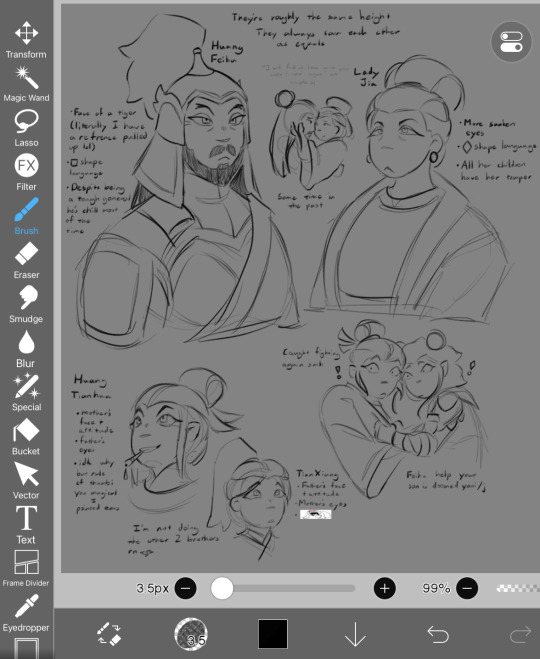
Next is the Huang family! Which have more people so this yap session is gonna be way longer. Buckle up lol
I always saw Huang Feihu as this serious and commanding general, but he’s also that sweet old guy who’d drop the hardest wisdom when you needed it. It’s what makes him really generally well liked
Like when NeZha rescues him and his family, he expresses a lot of subtle gratitude to this stranger that just saved his family’s lives. NeZha, a little unused to this kind of affection, brushes it off initially. But it leaves a lasting impression that eventually leads to him really connecting with the rest of the family
Feihu really be pulling his weight as a single dad of 4 + NeZha /j
I know Lady Jia narratively serves as motivation for the Huang family to rebel, but if there’s one thing I’m known for it’s giving female characters all my attention like they deserve
I think Lady Jia is a foil to her husband. Where he was serious but sweet, she was sweet but serious. Always polite and quiet, but was very stubborn and more prideful. You could not get her to do something she didn’t want to
All their kids got their mother’s pride, especially after her death. Imagine being TianXiang, about 7 at the time, suddenly being thrusted into rebellion and grieving the lost of his mom. TianXiang stronger than me, I would not have survived
I was listening to the Ithica saga when I made these concepts, so I may have had a few EPIC Telemechus thoughts put onto him lol. TianXiang mainly takes after his dad, carrying a much stronger empathy that stems from him. He was a kid, so he did kid shenanigans even in the Zhou camps and any neighboring villages. But he’s got his father’s charm, how could you say no to him? Especially with everything going on
As for TianHua, he takes after his mom mainly. A prideful hothead who wants to do great things. I got a little confused about his origin in the translation I read, but I think he was taken away from his family by his master when he was like 3. Which means he never got a chance to connect with his mom as when he joins the rebellion she was long dead (oough imagine how jarring it was for him to come back only to be the brother that most resembles their mom)
Ultimately, their pride and emotions were what lead to the Huang family’s downfall. TianHua, in his pride and stubbornness to fight, ignores his master’s warning of his fate. His father and brothers next, fighting both the Shang army and their own grief over loosing another family member. And finally TianXiang, his pride to his family making him unwilling to acknowledge the Shang dynasty. Plus, he’s the last living member of his family, what is there to loose?
God this bloodline is so doomed…
I was gonna yap more about them all but I think I’ve already written a lot lmao. Maybe I’ll save some of those thoughts for another post
#fengshen yanyi#fsyy#investiture of the gods#Lei Zhenzi#huang feihu#lady jia#huang tianhua#huang tianxiang
32 notes
·
View notes
Text
Chinese Mythology- Erlang Shen
If Achilles, Odysseus and Hercules are the Big Three of Greco-Roman mythology, the Big Three of Chinese mythology can probably be considered Sun Wukong, Ne Zha and Erlang Shen.
Sun Wukong is… Sun Wukong. You know him, you love him, whether as Black Myth Wukong, Son Goku, or just Wukong in all his glory. I also made a post explaining the mythology of Ne Zha, who’s recently risen to fame outside of China due to the movie Ne Zha 2 becoming the 8th highest grossing movie of all time.
Erlang Shen is probably the least well-known of the three. His title, 二郎神, means Erlang (Second Son) Shen (God). He has nowhere near as many adaptations as the other two, and outside of China I doubt anyone knows him.
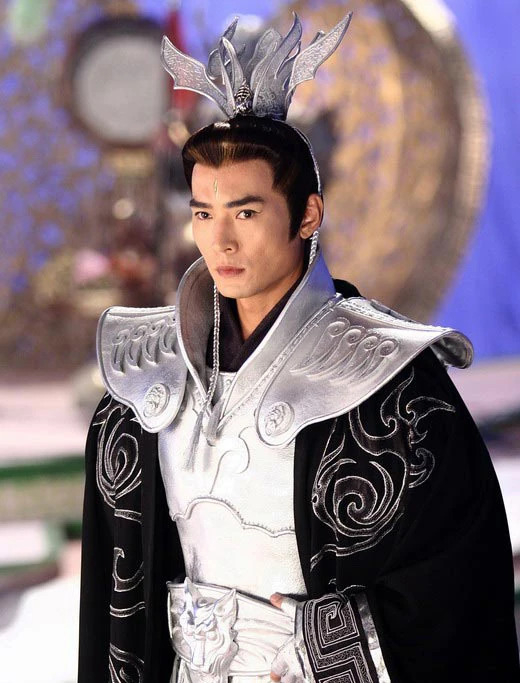
This is him! He's usually depicted as young and handsome.
Erlang, Ne Zha and Wukong are unofficially memed as the Heaven Haters, since all three of them rebelled against heaven in some way, or are depicted as rebelling against heaven. Wukong famously smashed the Heavenly Palace up a million times and Ne Zha is all about fuck authority.
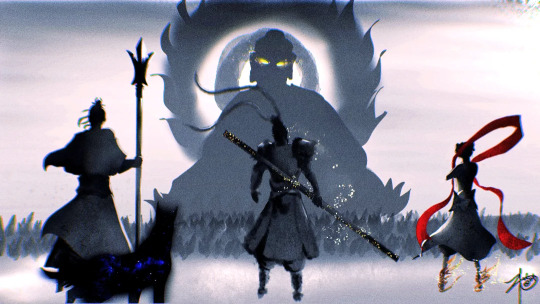
Artist 万葉皆秋 on Xiaohongshu and Douyin
Look at this beautiful art. That's Erlang Shen on the left, Sun Wukong in the middle, Ne Zha on the right. I doubt they'd win against the literal Buddha, but with anyone else any of them could kick anyone's ass. Actually in terms of strength Erlang Shen = Wukong > Ne Zha, but that's okay, Ne Zha's still strong.
What about Erlang, though? Actually, he’s the nephew of the Jade Emperor. The same one that got his ass kicked by Wukong. The same one that inadvertently led to Ne Zha having to kill himself.
Did you play Black Myth: Wukong? Well, I’m sure you remember Erlang Shen as one of the harder boss fights. Wasn’t his eye laser cool?
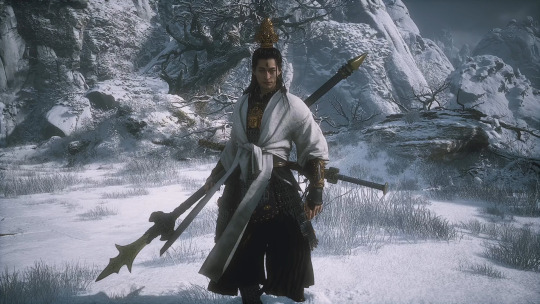
Erlang, the Sacred Divinity
Erlang doesn’t have one big myth like Ne Zha or Wukong do, and he doesn’t belong to any one major tale like Wukong and Journey to the West. He is also featured in Investiture of the Gods (for more on WTF that is, see my Ne Zha post and my Investiture post) and also fights for the rebellion against the tyrannical King Zhou of Shang. His stories are featured in multiple tales, which I’ll cover briefly.
Table of Contents:
Erlang’s Backstory
宝莲灯 Magical Lotus Lantern
Journey to the West and Investiture of the Gods
Erlang’s actual name is Yang Jian 杨戬. (Some interpret Erlang as the deification of an ancient Chinese engineer’s son, but modern adaptations consider him to be Yang Jian. There are multiple backstories for Erlang- this is not the definitive one.)
Other interpretations of Erlang include Yang Erlang (a pretty important guy that’s just also called Erlang with the last name Yang) as well as another guy whose name I don’t remember.
I only know stuff about the Yang Jian version, and it’s generally the most well-known (if you hear Yang Jian, you think Erlang, and if someone asks you what Erlang’s name is, you say Yang Jian. However, the Li Erlang version is also very famous, even though the stories are very similar).
His mother is the Jade Emperor’s sister! As mentioned in the Ne Zha post, the Jade Emperor is the leader of the Heavenly Court. See my Investiture of the Gods post here for details on the background of the Heavenly Court and the structure of the pantheon.
His mother is named Yunhua, and is the younger sister of the Jade Emperor. She fell in love with a mortal named Yang Tianyou, and fled secretly down to earth to marry him. They had a son named Yang Jian. When the Jade Emperor found out about this marriage, he sent armies to kill them because immortals and mortals marrying is against the rules.
Yang Jian manages to survive- he’s still only a baby at this point. Yunhua, as punishment, gets trapped under a big-ass mountain.
It’s unclear exactly what happens to Yang Jian after his mom gets the Wukong treatment. He’s raised in the palace, probably, and was taught to fight. Yang Jian is super powerful, and trains very hard.
OR
He was chased after by the Heavenly Court with his (maybe?) siblings and goes through a hell of a lot of pain trying to not get smited. Along the way, he becomes a super jaded, powerful and generally ruthless warrior.
When he finds out his mom is enduring the world’s worst stone table massage, he decides, fuck it, I’m going to break her out.
He goes down to the mountain his mom is trapped under, Tao Shan (Mt. Tao). This is when we discover Yang Jian is a dramatic sort of guy, because instead of doing the reasonable thing and pulling her out or even lifting part of the mountain, he decides to get a big-ass axe out and split the entire mountain in half.
Seriously, what were you going to do if you cut your mom in half along the way?
That’s Erlang Shen’s backstory! Both exciting and uneventful at the same time.
Well, how did he get from plain half-human half-god Yang Jian to Erlang Shen? He cultivated and trained so much and became so strong that eventually he ascended naturally, just like Ne Zha- no, his name is not on the Fengshen Bang, and no, he didn’t die to go work a boring government job for the Haotian Emperor.
The Fengshen Yanyi and Journey to the West are still just novels, and it’s unclear exactly how much of this is made-up or inaccurate.
Erlang Shen's defining trait is probably his mythical third eye. It's right smack-dab in the middle of his forehead, and it's called the Tianyan (or Sky Eye, or Eye of Heaven). It can see through disguises- this is how Erlang fights Wukong, who commonly uses disguises.
The third eye can also shoot lasers. Cool.
One of his biggest myths is the story of the 宝莲灯, Baoliandeng (Magical Lotus Lamp). In this story, Yang Jian (he has already become Erlang Shen at this point, through cultivation) belongs to the second category in the backstory options. He also has a sister.
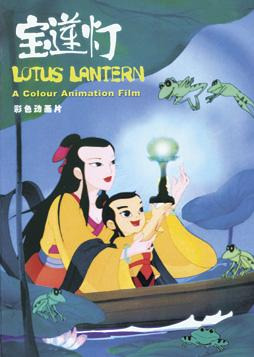
This is an animated children's movie based on the Magical Lotus Lantern made by the same studio that produced Ne Zha Conquers the Sea 1979.
By the way! It is unclear if the Erlang in this story is Yang Jian. As I said, there are very many possibilities as to who Erlang could be. Yang Jian is just one of them. The Erlang in this story (recall, Erlang just means second son, which is a semi-common name) could be the second son of someone else, but in popular culture (NOT necessarily in the myth!) this Erlang is the same Erlang Shen, and is also Yang Jian.
His sister is called Huayue Sanniang, or Sanshengmu. That’s a long-ass name, right?
Well, Sanshengmu means third saintly mother. Why third? She’s the third child of Mount Hua’s god. As such, Erlang (second son!) is her older brother. They have another brother.
This is why the Erlang in this myth is probably not the mythical Erlang Shen, Yang Jian- they have different parentage.
However, gradually these two stories merged. Keep in mind that Erlang Shen technically doesn’t appear in this story at all since he’s not actually Sanshengmu’s older brother.
The Erlang here just happens to be another Erlang. The reason why I’m including this tale is because it’s pretty common for these two Erlangs to be combined into one, so in popular culture it’s also very common to see them as the same person and to treat Sanshengmu as Erlang Shen’s younger sister.
In the Tang Dynasty, Sanshengmu meets and falls in love with a mortal scholar named Liu Yanchang. Erlang Shen vehemently opposes this marriage- he’s a pretty ruthless guy.
Sanshengmu steals the magical lotus lamp, which can trap gods and spirits within it, and escapes to marry Liu Yanchang. They have a son, Liu Chenxiang.
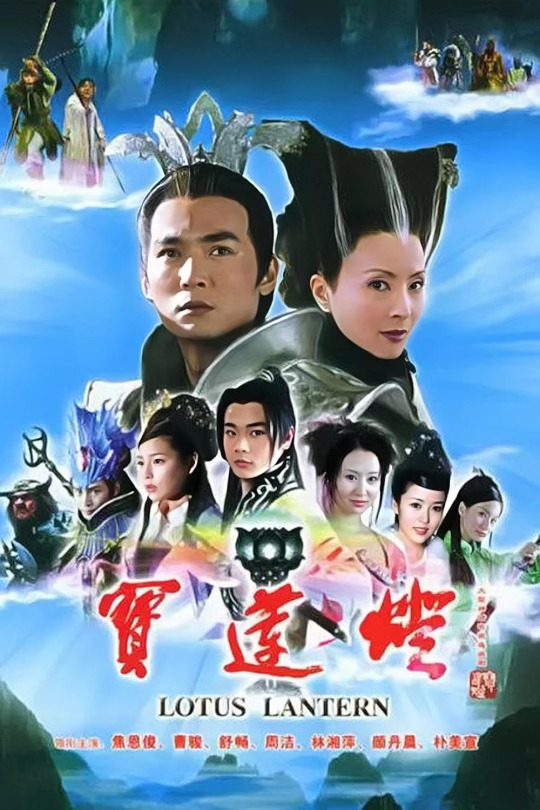
Here's a TV show filmed based on the same story. The guy at the top with a slit in his forehead is Erlang Shen (the slit is his third eye, which he doesn't ALWAYS keep open).
A few years later, though, Erlang Shen finds them and kidnaps Chenxiang to ask Sanshengmu to return the lotus lamp. She agrees, and in a strangely ironic twist of fate, Erlang Shen traps Sanshengmu under a mountain.
Chenxiang, after he’s grown up, decides he’s going to kick Erlang Shen’s ass as revenge for his mom. Erlang Shen isn’t Erlang Shen for nothing, though- even though Chenxiang acquires a mythically powerful axe and trains his butt off, he’s still unable to beat him.
However, in the end, Chenxiang manages to use the lotus lamp against Erlang Shen, and wins. Then, just as Erlang did, he splits the mountain in half and frees his mother.
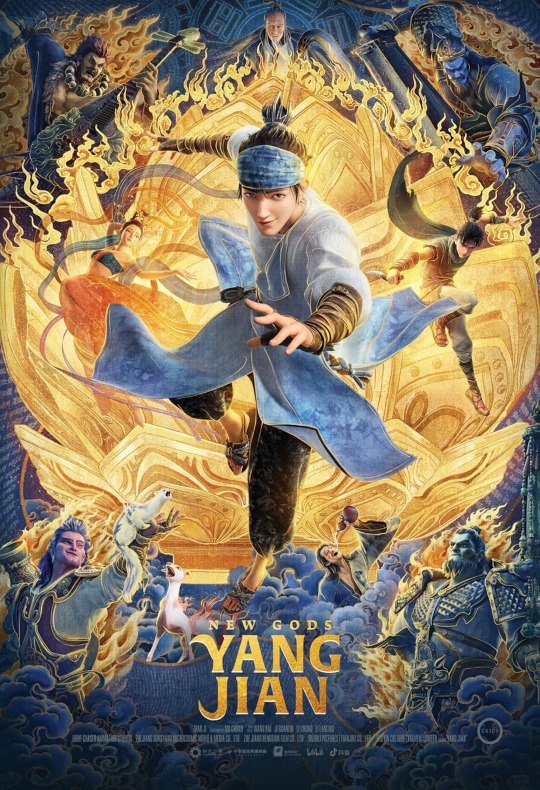
This is a recent animated movie called New Gods: Yang Jian. It's in the same animated universe as New Gods Reborn: Ne Zha (2021). I would recommend this movie: the plot is kind of a mess, but the animation is pretty great!
In Journey to the West, Erlang Shen emerges as one of the gods the Heavenly Court calls upon to try and beat Sun Wukong after he begins to rampage through heaven.
Although Sun Wukong is seen as the peak of fighting capability in Chinese mythology, Erlang Shen is actually just as strong- he beat Sun Wukong in Journey to the West, albeit with the help of some other gods.
In Black Myth: Wukong, Erlang "rematches" Wukong since Wukong was technically beaten.
Actually, Erlang Shen in Journey to the West is a bit of a crazy guy. He’s usually always seen as the trademark killing maniac (maybe not killing maniac, but definitely a little sadistic) since he literally set Huaguo Mountain (the mountain Sun Wukong lived on with his monkeys) on fire after he beats Wukong.
Later, however, he helps Wukong fight off another guy and the two become buddies. Funny how that works out.
If you remember, in Black Myth: Wukong, he had a dog with him!
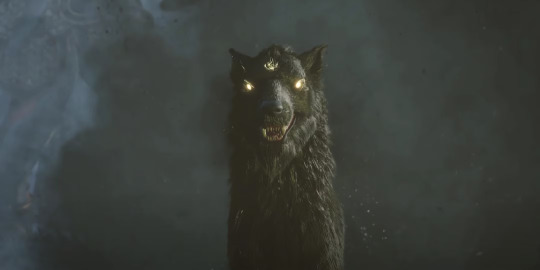
In all of Chinese mythology, probably the only famous figure that has a dog is Yang Jian, Erlang Shen. His dog is called Xiaotian Quan, or Howling Celestial Dog, is Erlang Shen’s companion, who fights with him.
This is why when the Black Myth: Wukong official account said they wouldn't spoil the next boss but that he had a dog, Westerners were confused but all of China was like. Bro, who else could it possibly be, the only dog dad in all of mythology who has anything to do with Wukong is Erlang Shen.
It was a bit of a Givenchy Ariana Grande situation.
In Fengshen Yanyi, Erlang Shen also fights with the Chan Sect and Ne Zha against the King of Shang. There’s one tale he’s famous for, where he’s the key figure in overturning the tide in a particular battle.
Erlang Shen had learned how to transform into 72 different living things, and he allowed himself to be eaten by his opponent’s spiritual beast. Then, he killed the beast from inside, transformed himself to look like it, then tricked his opponents and stole all their fancy shit.
He also used the 72 transformations against Wukong in Journey to the West.
Erlang Shen, Sun Wukong, and Ne Zha have all gotten recent modernised adaptations, and all three of them go against "traditional Chinese values" and still manage to be widely beloved and respected characters.
(Sun Wukong's most recent modernised movie is the 2015 Monkey King: Hero is Back, which was translated horribly since it really means something more like The Return of the King. The movie's plot is great, but the animation isn't as good as New Gods Yang Jian or Ne Zha 1/2.)
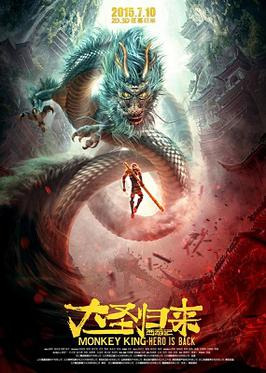
Look at that. Good movie, I hope they make a second one, and maybe they can get some advice from Jiaozi on how to improve the animation. I mean, it's not bad, but it's certainly not as good as it COULD be.
As such, the Heaven Haters boy band has officially debuted. Be sure to check out their debut album, "Fuck the Emperor", currently no. 1 in ancient China.
Wukong is still my favourite, just because he's the no.1 in every Chinese person's heart, but Erlang Shen and Ne Zha are also great.
Who doesn't love a crazy hot killing machine? Or a murderous fiery iPad kid on wheels?
Erlang Shen summarised:
A (slightly) ruthless but powerful righteous warrior with a third eye in his forehead that can shoot lasers and see through disguises. He fights with a cool mythical spear and has a super cute and super strong dog.
More on the Heaven Haters boyband later. I might make a big post as to why them hating heaven is significant.
#erlang shen#black myth wukong#chinese#chinese animation#chinese mythology#chinese history#chinese culture#chinese literature#ancient literature#ancient china#fengshen yanyi#mythology and folklore
124 notes
·
View notes
Text
Master and Disciple


Pt.1 | Pt.2
107 notes
·
View notes
Text

😂
98 notes
·
View notes